Spring/Summer 2023


ARTS FUNDING IS BROKEN – HERE’S HOW WE FIX IT



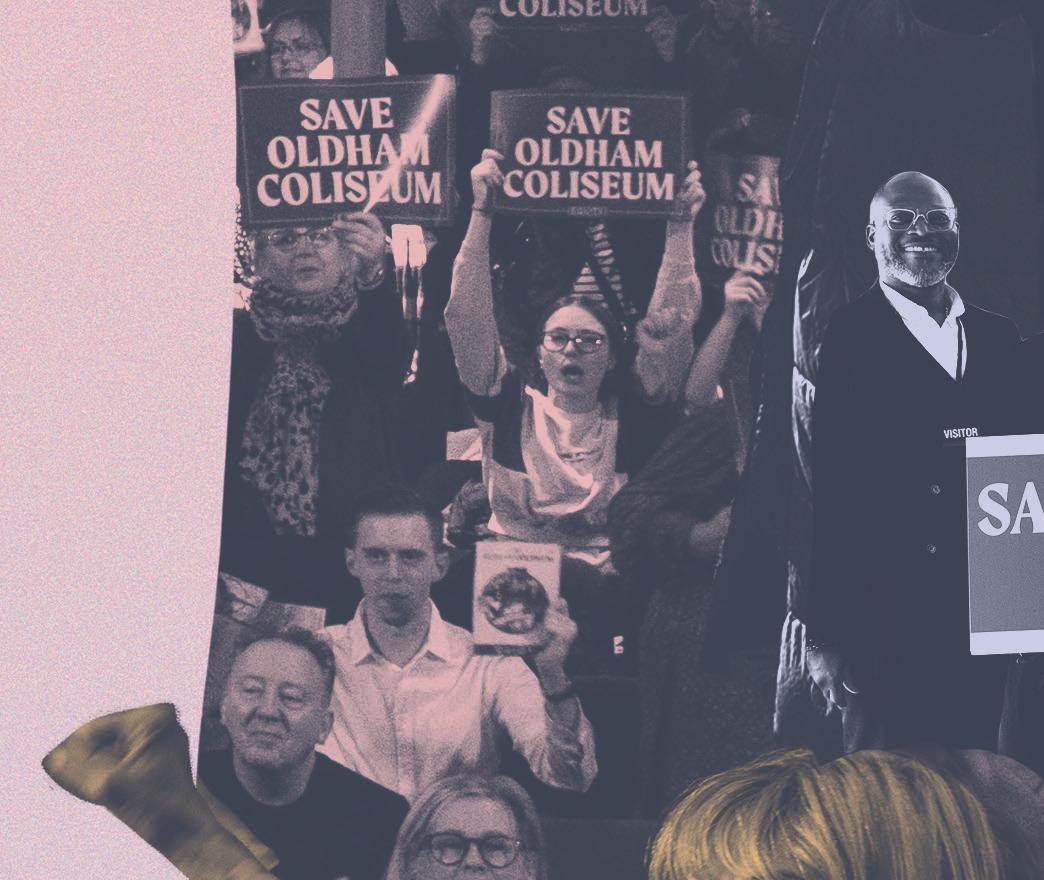
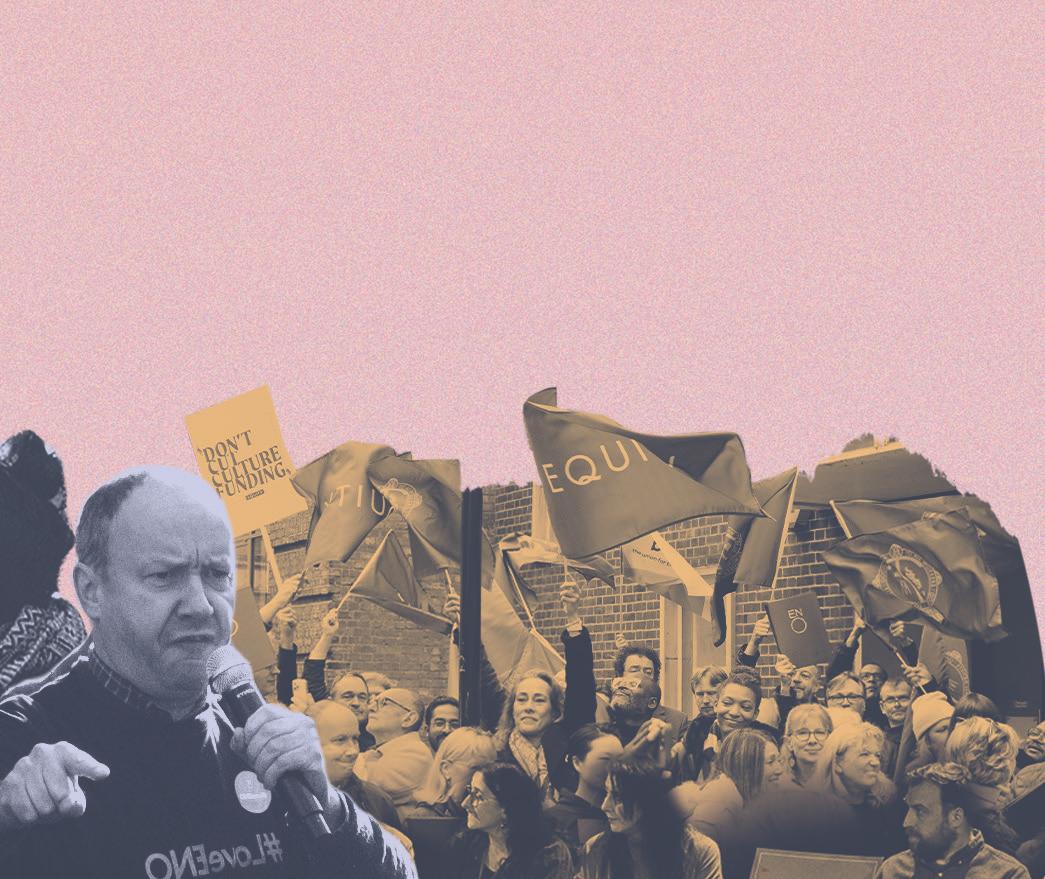

ALSO INSIDE: HOW WE STOPPED CHANNEL 4 PRIVATISATION · CELEBRATING 50 YEARS OF ICAF NEW REGIONAL DRAG ARTISTS’ NETWORKS · CAN INDUSTRY AWARDS BE TRULY DIVERSE?

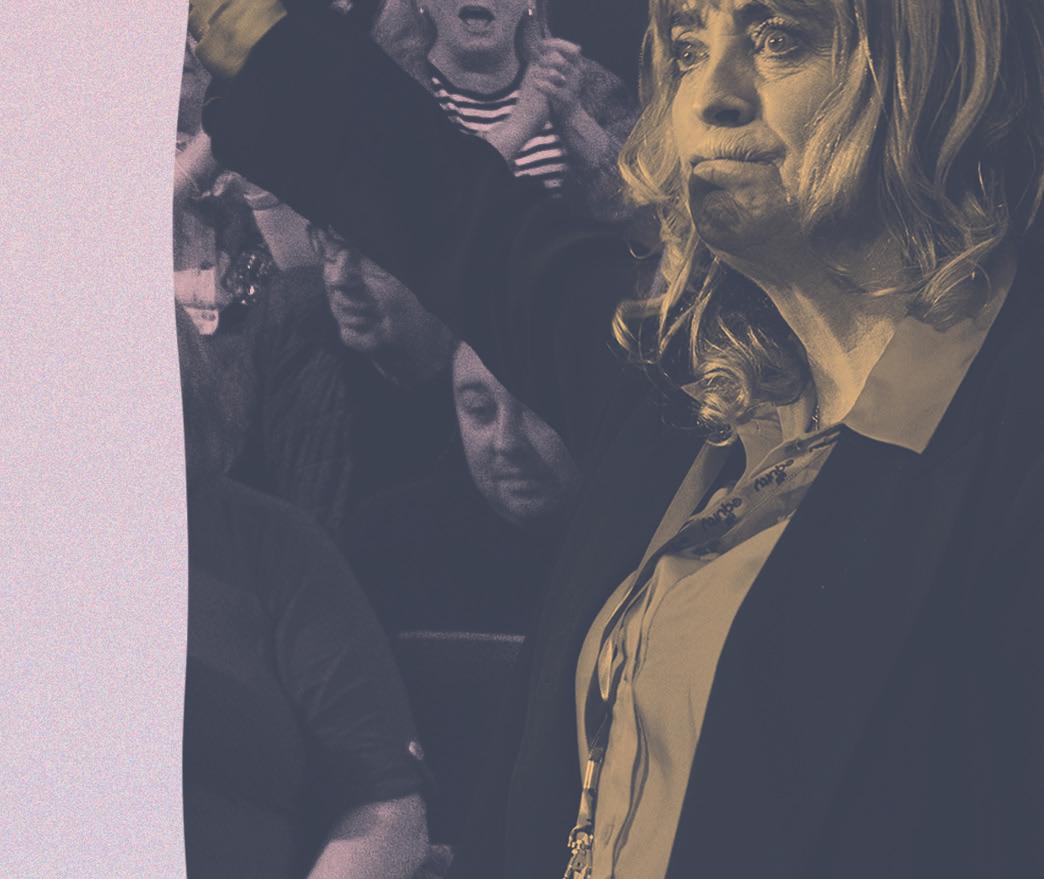

‘‘Those who fight, can lose. Those who don’t fight, have already lost’’
- Bertolt Brecht

REGULARS VIEWS NEWS NORTHERN IRELAND SCOTLAND WALES FEATURES A WIN 4 US! INTRODUCING… EQUITY DRAG ARTISTS’ NETWORKS CAN YOU HEAR US? BUILDING A SAFETY NET FOR ARTS WORKERS ARTS FUNDING IS BROKEN – HERE’S HOW WE FIX IT SHINING A SPOTLIGHT ON THEATRE DESIGN AND THE AWARD GOES TO… ELITISM? CELEBRATING 50 YEARS OF ICAF MEMBERSHIP OBITUARIES IN MEMORIAM GETTING INVOLVED DIRECTORY 2–5 6-9 10 11 12-13 14-16 17-18 19-21 22-24 25-30 31-33 34-37 38-41 42 43 44-45 46-47 CONTENTS 3
VIEWS
When we use our voices as working people, we stand to win more than material gains, writes Equity’s General Secretary Paul



In my first two years as General Secretary, when speaking to members, my focus has often been the change in tactics which Equity is making – from resilience to resistance – to face the new challenges of the 2020s and the perennial issues of low pay and precarity. After the last six months, though, I want to focus not on the power we have, but how we’ve used that power to win.











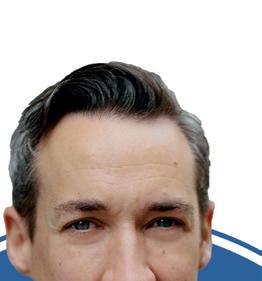

Plans to privatise Channel 4 have been abandoned after union members lobbied their MPs. After members stood up in the courts and won their holiday pay, we signed a collective agreement for the biggest pantomime producer in the world, Crossroads. We overturned a planned 10% cut to Creative Scotland’s funding as we used the strength of our growing Scottish membership to connect a coalition of opposition to this devastating proposal.
On the Independent Theatre Council (ITC) Agreement (which sets out the minimum pay, terms and conditions offered by independent theatre companies using union contracts) we won in excess of a 10% rise in pay, as well as transferring the duty to book touring accommodation to the producer, instead of the Equity member. Like every negotiation, this win came from our strong membership, the overwhelming majority of performers and stage management working in theatre – a group so loud and strategic that they can’t be ignored.
We have won an interim settlement at the English National Opera, thanks to rallies outside the Arts Council, and the amazing chorus – battle hardened from decades of government austerity – forcing the Secretary of State to take note of their rendition of ‘You’ll Never Walk Alone’.
Thanks to the constructive engagement of the Minister in a meeting with me earlier this year, Equity has persuaded the government to abandon plans to allow artificial intelligence technology to data mine our members’ work without remuneration. But although it was only a couple of people in that meeting – there’s no doubt that it’s our tens of thousands of members, and the expertise of an Audio Committee elected by them, which put me in that room.
We fight on in Oldham and the North-West to reverse the appalling Arts Council decision to slash their funding, and end producing theatre in the town – but the picture looks bleak. What is not bleak are the loud, proud activists who’ve kept their heads high and built an incredible movement
to reinvigorate Equity’s branches and campaigning. Our Work, Rest, & Pay campaigns across theatre have energised our members into a meaningful structural conversation about improved rest, reduced rehearsal weeks, and, most importantly, how we transform the broken digs system.

Our members give so many people a voice through their work as artists – whether it be the characters they play; the sets, direction, and costumes they create; their expression through dance and song of realities which spoken words cannot express; or the escape through acts they perform and the people they educate. Sometimes, however, the voice of our members as working people has been secondary to that.
Equity’s not just winning the pay, platforms, and structures that we need, we’re winning something bigger: revealing that there’s as much power and dignity in being a member of our movement, as there is in being an incredible artist.
W Fleming
“We are using the power of our strong membership to win”
4
Equity members rally to stop Channel 4 privatisation last year
VIEWS
“This theatre means so much to us. Not all of us will go into the industry, but the skills we’ve learned will transfer into things we do in the future and it will stay with us forever.”

Those were the words of a young member of Oldham Coliseum’s training programme for 16-25 year olds. They were speaking at a rally at the theatre in March, attended by 400 people to protest the closure of Oldham Coliseum after Arts Council England (ACE) pulled their funding.
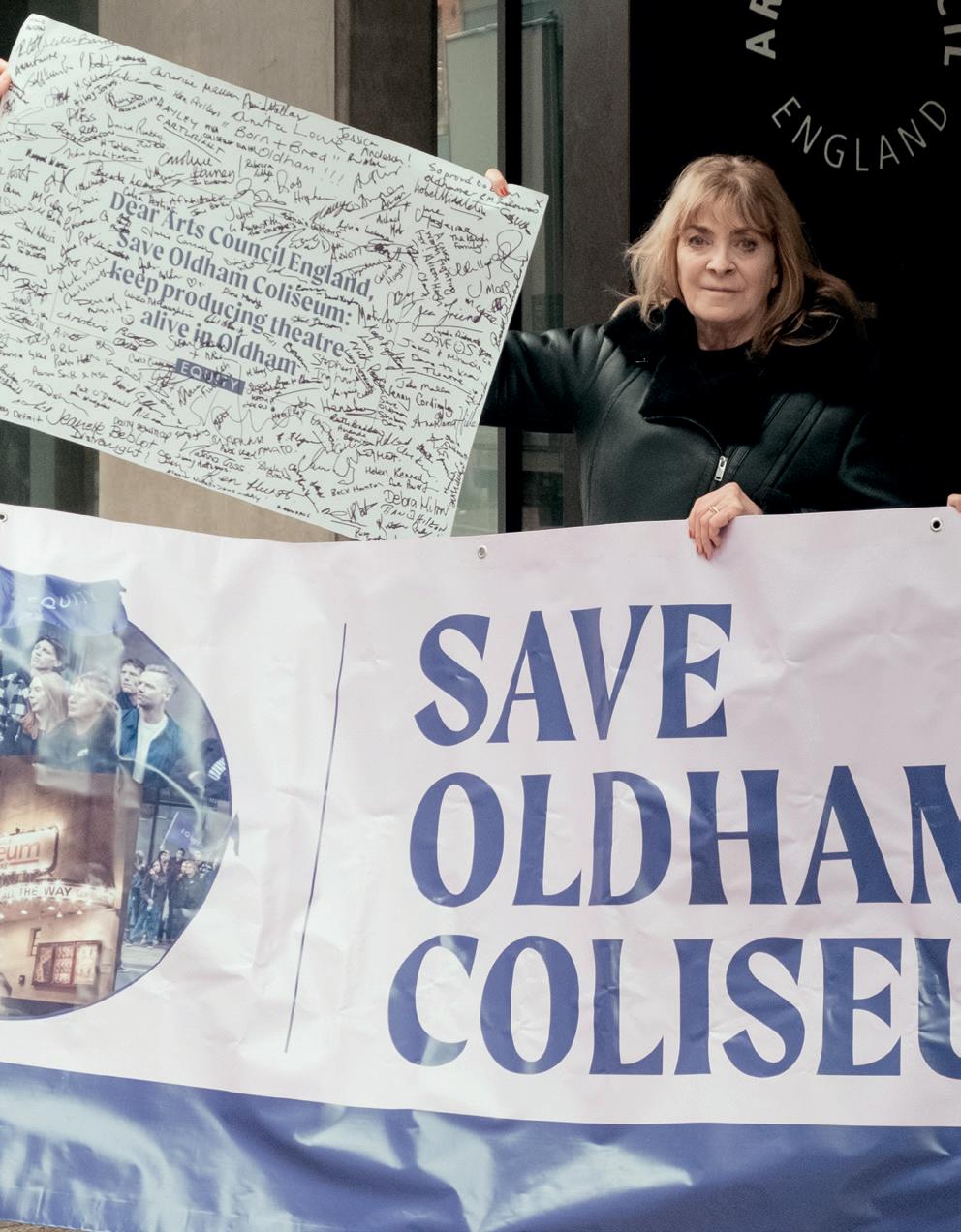
I will not forget those young people who were sat at the front of the dress circle that night, who spoke of the positive impact the Coliseum had on them and how its closure would remove opportunities for participation and enjoyment that had previously been offered to them locally.



Unfortunately, they never got to use the skills they’d learned on the programme to perform on the Coliseum’s stage, as the 135-year-old theatre closed forever at the end of March. Despite ACE pledging to spend the £1.8m cut from the Coliseum on arts provision in Oldham, and Equity’s hard campaigning yielding assurances about the money being used to create union jobs and for the lost 400 actor weeks to be replaced, the closure of the Coliseum means there is currently no producing theatre in the town.
That is something that is not easily replaced in Oldham, which has been identified as one of the most deprived towns in the UK. In fact, throughout the country, many of our smaller towns and rural areas are becoming cultural deserts.
This, coupled with the a lack of performing arts provision in state schools, means a potential career in the performing arts vanishes for young people in certain areas. Since 2010, enrolment in arts GCSEs has dropped by 40% and the number of arts teachers has decreased by 23% throughout England.
This is due to the fall in spending on education in the decade following 2009 and a Government that has cut the arts from the English baccalaureate – the set of subjects that GCSE students are encouraged to study. Meanwhile, private schools are investing substantially in arts provision, with state-of-the art theatres, fine art studios and concert performances.
It’s no surprise then that those from marginalised communities, including those from working class backgrounds, are being











edged out of the cultural sector. To fix this, there has to be a radical change to how the arts are funded, which ensures a diverse, inclusive and sustainable workforce. This is the subject of this magazine’s cover story, and you can read more about it – and on Oldham Coliseum and the Arts Council England’s recent funding cuts – on page 25. The topic of industry access for marginalised groups is also discussed on page 34 in a feature that asks whether industry awards can be truly diverse.
When it comes to ensuring access into the industry for young people, regardless of their class or where they reside in the UK, we need to see more arts funding for state schools, but also alternatives such as apprenticeships to expensive drama school training. And, of course, young people need jobs to go to – which is why this union will continue to fight against cuts to the arts, and defend jobs and work opportunities for our members, wherever they are based.
Equity President
Lynda Rooke reflects on the closure of Oldham Coliseum and
what it means for young people
“Young people need arts jobs to go to”
5
Lynda handing in a petition to Save Oldham Coliseum
Before I left drama school in 2005, we had one afternoon where somebody from Equity came to talk to us. At the time, we didn’t properly realise the importance of joining our union and signed up because we wanted to register our professional names. It wasn’t until my first London theatre job the next year that I understood.


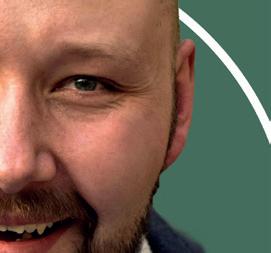





When my agent phoned me to say I’d been offered a role in a new production of Evita I didn’t really listen to the details; I was screaming in my mum’s face that I’d got my first job. It was moving out from my parents’ in Portsmouth to London, and then going into the technical rehearsal period, that I learnt that entitlement to subsistence or relocation allowances were negotiated by Equity, alongside the number of working hours during my week. An older member of the company said he would be happy to be an Equity Deputy – which means a union representative in the workplace – but would like one of the younger actors to join him so he could teach us and show us how being a Dep works, so I volunteered and became co-Dep.
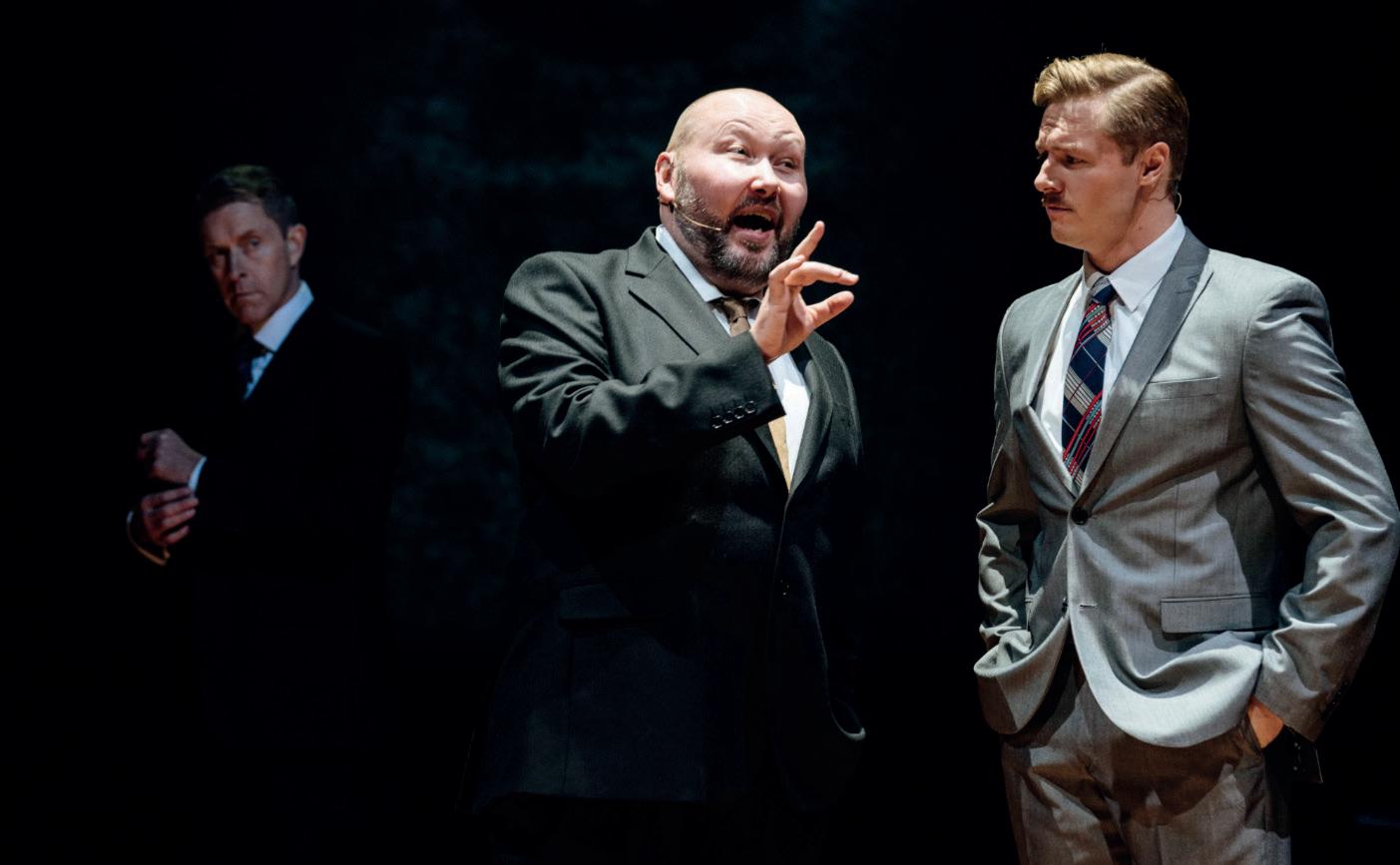
It was years later in 2017 when I went on my first tour. My wife, Anita, and I had to have a proper conversation about it because our son, Henry, was only three-years old at the time and it was a nine-month contract. I saw them every weekend, even if it was only a brief visit: one time it meant travelling from Newcastle, spending six hours at home and then going straight off to Swansea.

I did enjoy touring but digs could be tricky. Some were great, but you would learn that certain cities weren’t too great for digs and would then have to sort out a ‘treat week’ where you would stay in a hotel in that city and pay a bit more than your allowance rather than stay somewhere dodgy.
It was tough being away from my family and if I hadn’t connected with a ‘tour family’ it could have been a very lonely time. Some of those people became very close friends of mine and set up the fundraising page after my stroke last December, so having that group proved even more important in later years.

We were in the middle of previews for Mandela, a new musical at the Young Vic, when straight after the curtain call I came offstage and felt a bit lightheaded, but nothing too serious. After a few minutes, though, I had no control whatsoever of my left arm and leg, and started feeling pins and needles going towards my chest which was very scary. My cast mates got me to sit down backstage when I felt faint and members of the team at the theatre waited with me after calling an ambulance.
It took two hours for it to arrive as it was a busy Friday night, but they took me to King’s College Hospital. I had a number of scans there which revealed a bleed on the right side of my brain, which had caused a stroke. Although my mobility was greatly affected my speech was not.



 VIEWS Musical theatre performer and proud Equity Dep Adam Pearce tells us how the theatre community rallied around him after he experienced a lifechanging setback off-stage.
VIEWS Musical theatre performer and proud Equity Dep Adam Pearce tells us how the theatre community rallied around him after he experienced a lifechanging setback off-stage.
“Support from the union and people in the industry following my stroke has been incredible”
Performing in Mandela at the Young Vic (Credit: Helen Murray)
6
Adam with his wife and son
After the stroke, I spent two weeks in hospital, and then a further six weeks at a rehabilitation centre where I learnt to walk again. I had been cast to be in a new show and there had been a verbal agreement for me to hopefully join the production six months after the stroke. But I found out through a friend, rather than the proper channels, that the person who replaced me had been offered a year-long contract, so that was very tough. It was then that some of my old touring family started the GoFundMe page: Molly Lynch, Danny Mac and Dougie Carter – all Equity members.
I was very hesitant at first. I’m a proud dad, a proud husband: a proud human. I am from a working class background – my dad was a mechanic and my mum was a nurse – and I’ve always gone out and found work if I needed it, including during the pandemic
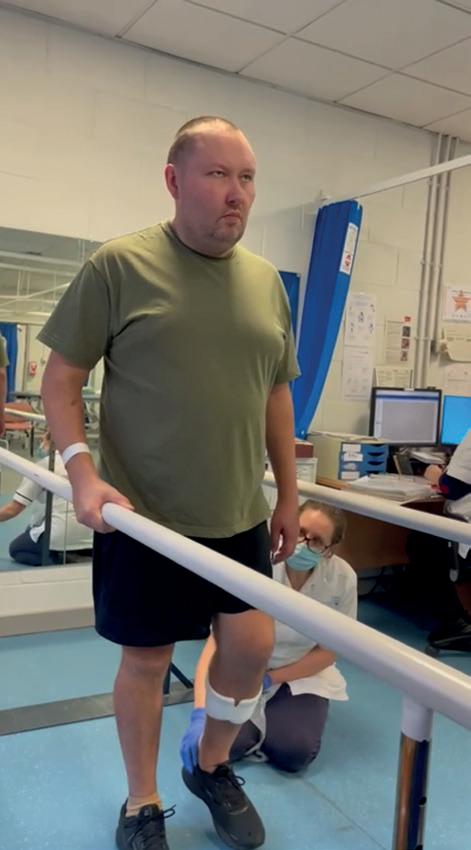
available to me; I will be receiving payments from these grants for the next 10 months. I told my wife that I would now be happy to be Equity Deputy for the rest of my life.
Sadly, the NHS is currently overwhelmed. I had to look to private care because I didn’t want to have to stop treatment while my recovery was going so well. Without the support of the union and people in the industry, I could never have imagined being able to pay for that.
My physio says that recovery is now my full time job. My walking is improving, which is great, but my hand and arm is taking longer. The physios have told me that is to be expected: it’s easy to underestimate the mechanics and fine-tuning it takes, even to pick up a 20 pence piece. A third of stroke victims don’t live to tell the tale and the doctors are confident I will make a good recovery so I know am very lucky. I will be starting singing lessons soon. Between that and my physical training, friends have told me it’s like I have gone back to drama school.
when I helped out at a Covid test centre and as a supermarket delivery driver. But after I heard about being replaced on the show, Molly suggested a soft launch of the fundraiser. The soft launch escalated quickly! People from my amateur dramatics days, front of house team members, lighting and sound designers I worked with in past productions all contributed, which was incredible.
The producers on Mandela continued my payments throughout the length of my contract in full after my stroke and my agent didn’t charge me commission which was a weight off my mind when I had no funding in place. Equity were able to give me an emergency bursary and the Equity Charitable Trust also supported me. Equity Subsidised and Commercial Theatre Official, Charlotte Bence, and the union’s Tax & Social Security team put me in the right direction of any grants that might be
I’m a very positive person but I have had some down days. It’s frustrating, but it is understandable. When I first started working, an actor in my cast took me under his wing and became a mentor to me. He had done leading roles in the West End, but in the particular production we were working on, he was in the ensemble. I looked at him and understood aged 21 that actually, his was the career that I wanted: I didn’t really want my name up in lights; I just wanted a constant career so that I could provide for a family one day, which is what I have since been able to do.
It was gutting when the show I was going to be in opened because that was the life I was going to have. But there will be other shows; there will be other openings.
Adam’s recovery fund can be found at gofundme.com/f/adam-pearce-strokerecovery-fund
As told to Salome Wagaine
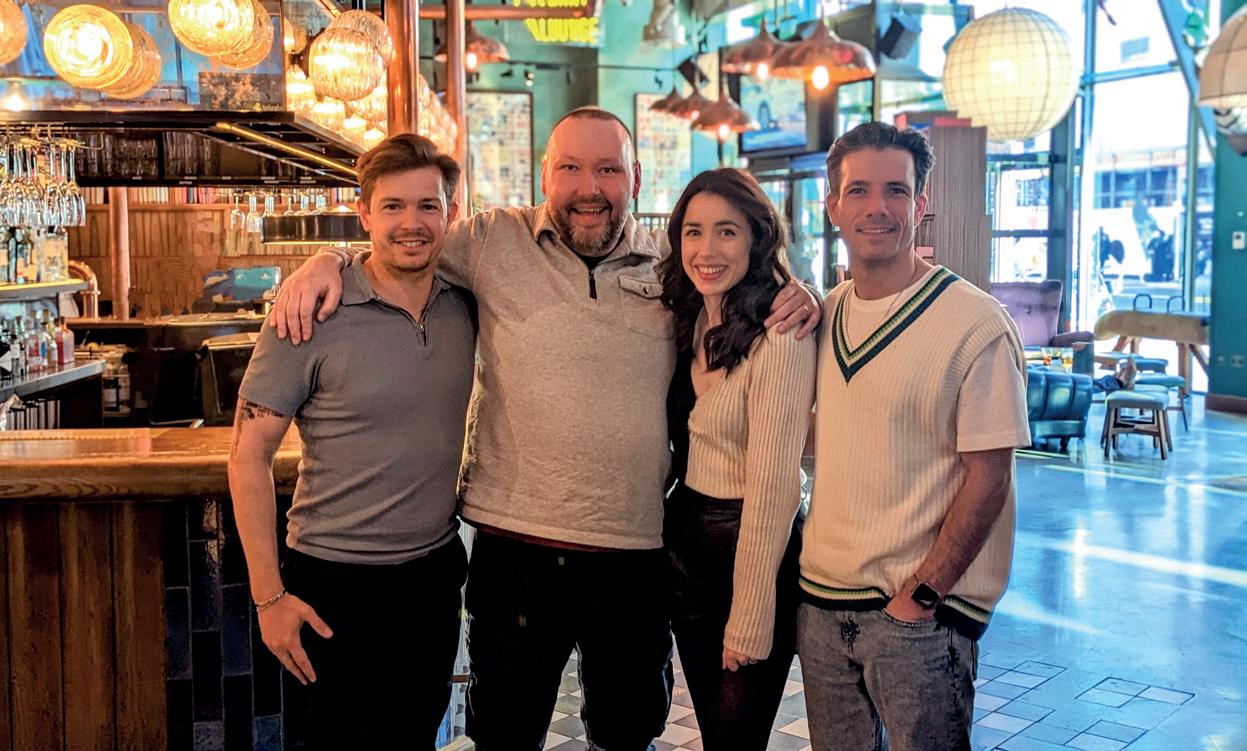 Friends: (from l to r) Dougie Carter, Molly Lynch, Adam Pearce and Danny Mac
Friends: (from l to r) Dougie Carter, Molly Lynch, Adam Pearce and Danny Mac
7
Undergoing physio after the stroke
Major pay rises and improvements for artists working on ITC union contracts
Equity and the Independent Theatre Council (ITC) have agreed major improvements to their agreement, meaning performers and stage management will benefit from an increase of over 10% to the minimum weekly salary (rising from £494 to £545) and an increase of 20% for the minimum daily fees (rising from £100 to £120).
For choreographers, designers and directors there will also be an increase of over 10% to fees.

ITC is the management association representing the independent performing arts sector and ITC members with Ethical Manager Status use union-approved contracts offering at least the minimum agreed terms and conditions.
The new agreement came into force in April 2023 and also sees:
• A 20% uplift on meal, daily accommodation, and commuting allowances.
• A major improvement to touring and relocation allowances which are to be combined into one living away allowance of £447.68 per week in London, and £410 per week outside of London. This sees an uplift of over 30% on the existing touring allowance, and an uplift of just under 250% on the London relocation allowance (which was £129 per week) and just over
290% on the relocation allowance outside of London (which was £104.80 per week).
• Most significantly, the agreement makes clear that the principal responsibility for finding and providing accommodation sits with producers, meaning stressful extra labour for the workforce and the undignified situation of staying in unsanitary and unsafe conditions can be prevented.
• The new agreement also makes a five-day week during the rehearsal period the norm, reduces overall maximum working hours, increases holiday entitlements to beyond statutory minimums, and places wellbeing and dignity at its heart with provisions guaranteeing support for physical therapy and the contractual requirement for producers to have Equal Opportunities, Dignity at Work and Environmental Sustainability policies.
“We’re really proud of what we’ve achieved for our respective members despite the huge challenges imposed by the funding landscape,” says Karrim Jalali, Equity’s ITC Industrial Official. “We hope that this will be a major influence on the industry as a whole. We’d like to say a sincere thank you to ITC and its Ethical Manager members who have worked so productively and fairly with us on these negotiations.”
8
Closure of BBC Singers suspended after campaign backed by 140k supporters
The BBC have decided not to close the BBC Singers after a campaign that attracted thousands of supporters.
BBC Singers is the UK's only full-time professional chamber choir but was targeted in March by proposed cuts by the public service broadcaster. The announcement came at a time when singing jobs across the country, such as those at the English National Opera, had already been threatened by public funding cuts and plunged singers into precarity.
Equity’s Singers Committee called on members to sign a petition created by the Independent Society of Musicians (ISM) and to complain to the BBC. The Committee condemned the proposed cuts at the time, saying: “These
proposals will be devastating to those whose jobs are at risk, and will also be deeply concerning for the Equity members who make up over 200 freelance singers earning their income by appearing alongside the permanent choir.” Less than three weeks later, over 140,000 people, including Equity members, had signed the petition. It was then that the BBC announced it had agreed with the Musicians’ Union that it would suspend the proposal to close BBC Singers after a number of organisations came forward to offer alternative funding options.
The decision marked a win for the many arts workers, audience members, trade unions, and campaign groups who joined together to make their voices heard on this issue.
The UK audiobook industry is a global success story, valued at £222.5m and growing. This has generated lots of employment opportunities for Equity members: our recent survey found that two thirds of audio artists undertake work in audiobooks.
Despite this success, the fees audio artists receive vary across the industry and too often do not reflect their professional contribution. Take-it-or-leave-it contracts asking to waive artists’ intellectual property rights are common practice. And the industry is susceptible to the impact of artificial intelligence with the development of automated audiobooks.
As the UK trade union for audiobook narrators, we are committed to improving our members’ working lives. Equity has a long-standing ambition to negotiate collectively bargained agreements with the major players within the industry that contain a fee structure for audio work and financial recognition for audiobook sales. We also want to protect narrators’ rights with clear and transparent contractual terms.
This is standard practice for most areas of the UK entertainment industry, such as film, TV, radio, commercials, and theatre, as well as overseas. For instance, many audiobook narrators in the US are engaged on collectively bargained rates.
The challenge we face is that many areas of the UK audiobook industry remain resistant to the benefits of collective bargaining. In recent months, Equity has met with major audiobook publishers and studios to discuss the idea
of establishing an agreement with minimum rates of pay and conditions. This was in response to our recent Audio Action Plan survey where members identified improvements in audiobooks as a key priority. Despite making positive inroads, there has already been refusal from some audiobook publishing companies to engage with Equity through the collective bargaining process.
We need all audio artists to work together to implement structural change. This starts with saying no to poor levels of pay and asserting your intellectual performers’ rights when negotiating contracts. Talk to other audio artists and be open about what publishers and studios are paying, share examples of good practice and similarly who to avoid. Finally, existing audiobook narrators can help bridge the gap between the publishing companies and the union: if you have a good relationship with a publishing company, encourage them to engage with Equity about agreed terms and conditions.
If you are an audio artist who would like to get involved in improving the industry or helping to deliver an audiobooks agreement, contact Equity’s Audio & New Media Official Liam Budd lbudd@equity.org.uk
9
We need a collective agreement to improve pay in audiobooks – here’s how you can help
The Equity4Women Toolkit brings together everything you need to know as a woman in the arts industry
Created by the Women’s Committee, the Equity4Women Toolkit aims to put any information you need at your fingertips within three clicks. It covers everything from contracts, to sexual harassment, to childcare, to menopause, to tax.
As an intersectional, inclusive resource, it also has useful information for those who don’t identify as women.
“Women work more hours for less pay less than our male colleagues,” says Kelly Burke, Chair of the Women’s Committee. “We are disproportionately affected by sexual harassment, low pay, and age discrimination. Add in caring responsibilities and the double impact of intersectionality, and what we don’t have is time to find the resources to make our working lives easier.”
In 2019, this spurred the Women’s Committee to create a guide where all that information could be easily accessed. “The Toolkit offers advice on issues such as miscarriage and sexual harassment, for instance, which people may be searching for information on while in crisis or survival mode,” Kelly continues. “So we felt it was really important that users are able to find what they need quickly.”

“And there are so many resources that people don't know are out there – for example, parts of the benefit system that people might avoid accessing because it seems too complex — but
where Equity can offer a lot of support.”
With the Equity4Women Toolkit now available online, the Women’s Committee have been showcasing it at open meetings in the nations, with events already held in Scotland and Wales, and soon Northern Ireland. They’re keen for all Equity women and members of any gender who might find the Toolkit helpful to benefit from this comprehensive resource.
“It’s really important for us that people have access to information on their basic rights so they can work safely, under fair conditions.” says Kelly. “Women and other marginalised members deserve to be well-resourced and have satisfying, sustainable working lives.”
You can view the Equity4Women Toolkit at equity.org.uk/ equity4women-toolkit or by scanning the QR code below.

10
How you’re stopping AI from stealing the show
Equity members helped to force the Government to withdraw a controversial proposal which would have allowed artificial intelligence companies to pinch performers’ data.
Under this ‘data-mining exemption’ AI companies would have been able to use even copyrighted content online to develop artificial intelligence for commercial purposes, including from performers’ work and offering them no payment.
Equity members opposed these proposals under the union’s Stop AI Stealing the Show campaign, writing to MPs, spreading the word on social media, and developing guidance. This culminated in a meeting between Equity’s
General Secretary Paul W Fleming and Julia Lopez MP, a Minister from the Department for Culture, Media and Sport, to discuss this issue.
Shortly after this meeting, Lopez announced in parliament that the Government would not be proceeding with these proposals, instead heading back to the drawing board to consult.
This is a fantastic victory for Equity members, and a step towards stopping AI stealing the show. But now we need to keep a close eye on whether these proposals return in a different guise, while we continue to campaign for further regulation of AI to protect performers.
Landmark agreement signed with world’s biggest pantomime producer
Equity and Crossroads Pantomimes have put pen to paper on a landmark pantomime agreement, meaning all performers and stage management who work for the world’s biggest pantomime producer will now do so on a union agreement.
The agreement will come into effect for the 2023/2024 pantomime season for Crossroads productions across the UK. Overall, Crossroads produces 24 pantomimes across England, Wales, Scotland and Northern Ireland.

Like all collective Equity agreements, it provides for holiday, sick pay, Equity pension, hours of work, breaks and sets the minimum floor for weekly pay and overtime.
It’s hoped that this will serve as a catalyst for other commercial pantomime production companies to follow suit. If successful, it will give casts the certainty of good terms and conditions across the major pantomime production companies, help raise industry standards, and allow for a much more even playing field across producers. Audiences can also be assured that performers and stage management working on productions do so under fair and dignified conditions.
For performers and stage managers engaged on or due to be engaged on non-union pantomime productions, we recommend running your contracts by an Equity official to ensure that the work is legally compliant.
11
First ever Equity in-house agreements signed
in Derry-Londonderry
The union has worked with The Playhouse and In Your Space Circus to design two in-house agreements, formalising terms and conditions that benefit all performers and stage management who work for these organisations.
In Your Space is a circus school and street theatre company and their agreement was not only the first ever Equity agreement in Derry-Londonderry, but the first circus in-house agreement in the whole of the UK.





Meanwhile The Playhouse is Derry-Londonderry’s leading producing theatre as well as an arts centre and is known for using the arts to build peace. Its agreement is the first ever in-house theatre agreement to be signed in Northern Ireland outside of Belfast. The agreement also includes terms relating to performances which include artists educated at The Playhouse Music Theatre Company.
The new agreements formalise minimum rates of pay for professionals equivalent to the industry standard, and set out maximum working hours, holiday entitlements and reference to dignity at work policies. They make up two of a total of eight in-house agreements across Northern Ireland, all of which have been signed in the last two years.
“Our members deserve decent pay and conditions just
like workers in any other sectors and these companies are leading the way in the city’s theatre and circus world and beyond!” said Alice Adams Lemon, Equity’s Northern Ireland National Official. “We look forward to more of the area’s live performance producers following in their footsteps.”
 Equity’s Alice Adams Lemon with The Playhouse's Kieran Griffiths (Director & Producer) and Mike Moriarty (Chairman)
Equity’s Alice Adams Lemon with The Playhouse's Kieran Griffiths (Director & Producer) and Mike Moriarty (Chairman)
12
In Your Space Theatre
Campaign wins back £7m for arts organisations across Scotland
When the Scottish Government announced in December that it would be slashing 10% from Creative Scotland’s budget, the decision was met with outcry – and action.
Creative Scotland is the public body that distributes funding from the Scottish Government to creative organisations across Scotland. This meant that the £7million cut would hit the arts industry, with Creative Scotland’s chief executive Iain Munro warning that it would have to cut in half the number of organisations it provided long-term funding for.
“Let’s be clear, with inflation into double digits, this isn’t a 10% cut to arts funding. It is much worse than that,” said Equity’s National Official for Scotland, Adam Adnyana at the time.
So with the endorsement of the Scottish National Committee, Equity launched an information and letter writing campaign demanding a reversal of the proposal. Over the Christmas period Equity members sent over 600 emails to over 90 MSPs highlighting the impact these cuts would have on local economies and the threat posed to employment opportunities in the Scottish creative industries.
Lobbying activity was also undertaken as part of our membership of Culture Counts, an advocacy network of Scottish creative organisations. We worked with fellow

member unions of the Scottish Trades Union Congress (STUC) to collectively take action, with STUC General Secretary Rozanne Foyer writing to the Scottish Government. Separately, grassroots group Campaign for the Arts gained over 15,000 signatures to its petition to stop the cut.
Following this sustained pressure, the Scottish Government announced a U-turn on the cut in February. Not only did this safeguard the survival of arts organisations, but it was also a demonstration of the power of our union and its networks in Scotland.
Birds of Paradise theatre company also receives funding (Credit: Andy Catlin)


13
The Royal Lyceum Theatre in Edinburgh receives funding from Creative Scotland
Cymru
Dathlu ein diwylliant Cymreig yn yr Eisteddfod – Gŵyl gelfyddydol fwyaf Cymru
Mae Eisteddfod Genedlaethol Cymru yn ddathliad blynyddol gwasgarog o ddiwylliant Cymru gyda hanes yn ymestyn yn ôl cannoedd o flynyddoedd. Yn cael ei gynnal dros wyth diwrnod yn ystod wythnos gyntaf mis Awst, mae’r digwyddiad yn newid lleoliad bob blwyddyn yn gyfan gwbl yn Gymraeg gyda ‘Phentref Dysgwyr’ pwrpasol i ddarparu gwybodaeth ddwyieithog, gweithdai a gwasanaethau cyfieithu i ddysgwyr ar gyfer y rhan fwyaf o ddigwyddiadau. Tra bod cystadlaethau wedi bod yn draddodiadol yn ganolbwynt i’r Eisteddfod – o ddawnsio gwerin i ganu corawl a barddoniaeth – mae hefyd wedi esblygu dros yr 50 mlynedd diwethaf yn ŵyl sy’n cynnig perfformiadau artistig o bob math gan gynnwys drag, dawnsio stryd a cherddoriaeth rap, sydd yn denu 150,000 o ymwelwyr y flwyddyn.

Mae Saran Morgan, actor sy’n gweithio ar draws teledu, radio, ffilm a theatr yn y Gymraeg a’r Saesneg, yn fynychwr cyson ac wedi perfformio yno hefyd. “Mae’n ŵyl wych iawn,” meddai. “Mae’r rhan fwyaf o berfformwyr Cymru sydd wedi’u magu yn y Gymraeg – yn mynd i ysgolion Cymraeg neu o gartrefi Cymraeg – wedi cystadlu yn yr Eisteddfod mewn rhyw ffordd ar hyd eu hoes. Rwy’n adnabod llawer o bobl sydd wedi mynd ymlaen i fod yn bobl broffesiynol y mae eu profiadau cyntaf o berfformio o flaen cannoedd o bobl yn yr Eisteddfod.”
Yn aelod Equity ers ei bod yn 17 oed, siaradodd Saran y llynedd mewn digwyddiad panel yn yr Eisteddfod ar fanteision aelodaeth undeb. “Efallai y bydd pobol ifanc sy’n llefaru neu’n canu mewn cystadlaethau yn mynd i mewn i’r diwydiant eu hunain yn y dyfodol, ac roedden ni eisiau rhoi gwybod iddyn nhw fod ymuno ag undeb yn ffordd wych o lywio’r diwydiant. Mae’n ffordd i fod yn rhan o gymuned fel perfformiwr oherwydd rydych chi’n gwybod bod rhywun wastad wedi cael eich cefn.”
Mae Eisteddfod Genedlaethol Cymru yn cael ei chynnal ar 5 – 12 Awst eleni yn Llŷn ac Eifionydd, Boduan, Gwynedd, gydag Equity yn bresennol. Os hoffech chi gwrdd â ni, e-bostiwch cymru@equity.org.uk.
14
Wales
Celebrating Welsh culture at the Eisteddfod – Wales’ biggest arts festival
The National Eisteddfod of Wales is a sprawling annual celebration of Welsh culture with a history dating back to 1176. Taking place over eight days in the first week of August, the event changes location every year and is entirely in Welsh, with a dedicated ‘Learners Village’ to provide learners with bilingual information, workshops and simultaneous-translation for many events. While the focus of the Eisteddfod has traditionally been its competitions –from folk dancing to choral singing and poetry – it has also evolved in the past 50 years into a festival that offers artistic performances of all kinds including drag, street dance and rap music, and attracts 600,000 visitors a year.
Saran Morgan, a bilingual actor who works across TV, radio, film and theatre in Welsh and in English, is a regular attendee and has performed there too. “It’s a really brilliant festival,” she says. “Most performers in Wales that have been raised in the Welsh language – going to Welsh schools or from Welsh-speaking homes – have competed in the Eisteddfod in some way along their lives. I know a lot of people who have gone on to be professionals whose first experiences of performing in front of hundreds of people was at the Eisteddfod.”

An Equity member since she was 17, Saran spoke last year at a panel event at the Eisteddfod on the benefits of union
membership. “Young people who are reciting or singing in competitions might be going into the industry themselves in the future, and we wanted to let them know that joining a union is a great way to navigate the industry. It’s a way to be part of a community as a performer because you know that someone’s always got your back.”
The National Eisteddfod of Wales is taking place on 5 – 12 August this year at Llyn and Eifionydd, Boduan, Gwynedd, with Equity in attendance. If you would like to meet up with us, email cymru@equity.org.uk.
 Uchod; Panel ar aelodaeth undeb yn y sector creadigol, yn cynnwys aelod Equity Saran Morgan / Above; An Eisteddfod panel on union membership in the creative sector, featuring Equity member Saran Morgan
Uchod; Panel ar aelodaeth undeb yn y sector creadigol, yn cynnwys aelod Equity Saran Morgan / Above; An Eisteddfod panel on union membership in the creative sector, featuring Equity member Saran Morgan
15
Dde: Aelod Equity Saran Morgan / Right: Equity member Saran Morgan
A WIN US!


Two years and four Culture Secretaries ago, the Government made the baffling announcement that it would be looking into privatising Channel 4. From the very start, Equity joined with other unions and campaign groups to take up the fight to keep Channel 4 in public ownership – and won.







When the Government put the idea of privatisation to public consultation, an overwhelming 96% of respondents –including Equity – made clear our opposition.



 How co-ordinated action stopped the privatisation of Channel 4
How co-ordinated action stopped the privatisation of Channel 4
16
Channel 4's Leeds headquarters
In the Autumn/Winter 2021 issue of this magazine, we made the campaign to Save Public Service Broadcasting our cover story, accompanied by a piece penned by Tracy Brabin, the Mayor of West Yorkshire, on the disastrous consequences the privatisation of Channel 4 would have for the creative sector and Equity members in the North of England.




Then in September 2021, we proposed a motion at the Trades Union Congress, calling on UK unions to oppose the privatisation of Channel 4 and support Equity’s campaign to protect public service broadcasting. The motion passed unanimously and was backed by the TUC, its 48 member unions, and the 5.5 million working people they represent.








Together with other entertainment unions, we sent a letter to then-Culture Secretary Nadine Dorries in September urging her to reconsider the Government’s plans.

When the Government pressed ahead with its privatisation plans in Parliament in April last year, many of you joined the fight by lobbying your MP, signing the petition and spreading the word on social media.


This was followed by our demonstration in May outside Channel 4’s recently opened headquarters in Leeds – the location of Equity’s 2022 annual conference – followed by a rally in the evening.




17
In November, we partnered with public ownership group We Own It to hold publicity stunts outside Channel 4’s offices in London and Leeds, handing in birthday cards on the broadcaster’s 40th birthday that called for it to stay in public hands.






Then at the start of this year, the plans to privatise Channel 4 were finally abandoned under another Culture Secretary, Michelle Donellan, who rightly described Channel 4 as a “British success story and a linchpin of our booming creative industries”.


We’re glad the Government saw sense. The argument for privatisation hinged on the claim that Channel 4, whose special remit means that it is publicly owned and commercially funded through advertising – at no cost to the tax-payer – could not survive in the streaming age.
Yet the broadcaster’s robust profits and healthy viewing figures said otherwise. What’s more, under its ‘publisherbroadcaster’ model Channel 4 supports independent TV producers by commissioning its content – which must reflect the diversity of the UK – solely from external production companies. Most of this content is made outside London and much of the scripted work, such as drama and comedy, is done under union agreements.
Our campaigning led The Big Issue to name us a Changemaker of 2023, calling the union “among the most prominent protesters to rally public support” to stop the privatisation of Channel 4. Thanks to Equity members and many others who defended the public ownership of the broadcaster, we have for now ensured the future of diverse and independent TV production, made on union agreements, across the nations and regions of the UK.
18
Hollyoaks actress and previous Equity Councillor Dawn Hope addresses the rally in Leeds
Drag as an art form has a long history in the UK but it’s fair to say that it is in the spotlight at the moment. The arrival of the cultural behemoth that is Drag Race has created widespread interest that has reached far beyond the LGBT+ bars and clubs that have traditionally been its main domain.
From theatrical productions and live shows to drag brunches and hen-dos, from appearing on Celebrity MasterChef and brand deals to bars and clubs the length and breadth of the UK, there are a huge range of opportunities for performers working as drag artists.

But with the proliferation of opportunities to find work in drag come all of the problems members often face as selfemployed variety performers: unsafe working conditions, issues with late and non-payment of fees, low pay or engagers expecting performers to work for exposure, and poor or non-existent changing facilities.
The explosion of visibility and demand for drag means many people are booking tickets to shows in bars and drag brunches who have little experience of this art form and there are widespread examples of customers grabbing drag artists as they perform and groping or even sexually assaulting them.
Performers also face challenges travelling to and from work: if the venue you are performing in doesn’t have a dressing room then you may have to commute to the venue in drag, and with homophobic and transphobic attacks at an all-time high performers have real fears about their safety.
Most worrying of all, a toxic combination of far-right groups and online conspiracy theorists have fuelled a terrifying rise in these attacks, targeting drag artists and other performers who put on family friendly shows or shows aimed at parents with babies.
These issues should be met with collective action so that no drag artist feels unsafe or exploited doing their job. In recent months, work has started in various parts of the country to set up Equity Drag Artists’ Networks. These are spaces where both Equity members, and those who haven’t yet joined the union, can come together and start to organise to tackle the issues they face in their working lives.
Networks have already launched in London, Manchester & North West, and Scotland, with more planned for

Birmingham & West Midlands, Bristol & West of England, Cardiff & Wales, East Anglia, and more. What’s becoming clear is that while drag artists across the country share many of the same experiences, significant regional differences also exist.
At the inaugural meeting for the North West network for instance, discussion focused on improving pay and working conditions, and tackling rogue employers. Meanwhile in Scotland, many felt there was a need to boost the visibility and prestige of drag as an art form to create more opportunities for paid work.
By building strong local groups we will be able to start to approach venues about problems raised, as well as work with the good engagers to put in place agreements on decent working conditions and fair pay. With a cost of living crisis and the possibility of recession, the danger of a race to the bottom on pay is ever present and it’s only through collective action that we can fight to improve this and ensure that where money is being made, you are being paid.
We are only at the very beginning of setting up these networks but it will be up to you – the members – to decide the precise format they take and the work they prioritise. We hope all drag artists can come along and build on the solidarity that already exists within LGBT+ communities to improve the working lives of Equity members across the country.

If you’d like to get in involved with your regional drag network or set one up, contact drag@equity.org.uk. For updates on the union’s drag artist work, follow @EquityDrag across social media platforms such as Twitter and Instagram.


19
As regional networks launch across the UK, Equity’s Variety Organiser Rob Lugg explains how strong local groups can help improve the working lives of drag artists.
Meet the drag artists helping to launch networks in their area

Emma Round aka Crip Ladywood – Birmingham & West Midlands
“I’m a drag king and one of the UK's few wheelchair-using drag artists. I'm based in Birmingham and am setting up a Drag Artists’ Network for the city and the West Midlands – you can join us at the Birmingham Hippodrome on 12th June! We want to get as many people together as we can, both Equity members and non-members. There are a lot of politically switched on drag artists in Birmingham, and so many talented and creative people here travel all over the country to perform. There's an awful lot of issues that need to be improved, such as pay and conditions, and as a disabled performer, for example, most workplaces don't have a ramp onto the stage. I’m trying to highlight these problems, but one voice doesn't make a difference – we need the solidarity of all performers.”


Joseph Ballard aka Titania Trust – East Anglia
“Titania Trust may harp on with jaded nostalgia of the old days upon the stage, but her main aim is always to make people happy. I've been performing as her since 2011 and have been an Equity member for even longer – since 2005. I’m currently serving as a Councillor (members elected to the union’s governing body) for Variety, Circus and Entertainers, and am Secretary of the East Anglia Branch. I’m now setting up the East Anglia Drag Artists’ Network – there's a really active drag scene where I’m based in Norwich and drag events are happening across the region. But the rural nature of East Anglia means sometimes those artists can feel extra vulnerable, so it’s important we have a Network here. I also want to highlight that drag is not just in London, or Manchester, or the big metropolitan cities, but that it exists everywhere, and can entertain and inspire communities all over.”
Dorian T. Fisk – Scotland
“I helped set up the Drag Artists’ Network in Scotland because, on the one hand, while there is an underground DIY drag scene that's thriving, when it comes to more commercial engagements, such as promoter-led shows, the art form is notorious for not being very well paid and local performers are not always being treated professionally. My interests lie in getting drag artists organised to try to improve things like pay and setting standard terms and conditions when working on commercial drag shows, as it’s currently not common practice to have contracts for some engagements. You can invest money, time and effort into getting ready and rehearsing, but at the last minute you might be informed that the ticket sales were low, so the plug is being pulled on the whole thing. If we want to do anything, in terms of effecting change and bettering our circumstances, we need to band together – so if you’re a drag artist based in Scotland, come along to our next meeting on 5 June!”

20
(Credit - Donald Scarr)
Can you hear us?
Stephanie Soh finds out why there are so few artists of colour working in audio and how the industry is changing
Lucy Sheen is a classically trained actor who graduated from Rose Bruford College in the 1980s and has been working across stage and screen ever since. An Equity member, she’s done some voice acting work over the years, but finds it difficult to land roles beyond a certain character type.
“I don't think, apart from one of the very first early BBC radio dramas that I did, that I have ever been cast in anything on radio that didn't require the actor to be of East or South-East Asian heritage, which is bizarre,” she says.

Lucy’s heritage is indeed of East and South-East Asian origin, but her first language is English and she speaks with a natural Received Pronunciation accent in a voice that has a deep, rich quality. “People just see my mug shot and think ‘Oh, she can only read or narrate things that are to do with East or SouthEast Asia’,” Lucy tells us. “But there's no reason why I can't be doing the classics, or contemporary dramas, or narrating documentaries on TV when they require a female voice that has a certain gravitas and a certain vocal quality.”
Stereotyping voice artists based on their racial identity is just one issue facing people of colour who work in the audio world. Equity has been working closely with Ofcom for




several years to push for improved monitoring of the diversity of freelancers across the broadcasting industry, but scant research exists to tell us the exact numbers of audio artists of colour. Anecdotal evidence, however, points to the fact that it is very low – possibly lower than roles in the wider performing arts and entertainment sector, such as acting, dancing and singing.
A very white space

“There is perhaps less scrutiny on how diverse the profession is because you can’t see the performers,” says Liam Budd, Equity’s Audio & New Media Official. Liam reports that Equity surveys of audio artists show only a few percent as being from non-white backgrounds – far lower than the 18.3% of non-white people who make up part of the British population.
“Traditionally it's been a very white space,” says Liam. “It’s a small industry and structural barriers have always been there: to get a good job you often need a good relationship with a studio or producer, so it's built on who you know.”
“And who are these people making these decisions?” Liam continues. “It's based on their idea of a voice, but the

 Des Yankson (Credit: Nathan Dainty)
Des Yankson (Credit: Nathan Dainty)
21
Lucy Sheen (Credit: Sarah Lam)
majority of people who work in publishing [and produce audiobooks], as well as advertising, are white and middleclass.”
Liam also highlights the financial expense involved in entering the profession: a home studio or technical equipment, for instance, can set someone back thousands of pounds. As economic marginalisation intersects with racial inequality, this can be a barrier for budding audio artists of colour.

Daniel York Loh, Chair of Equity’s Race Equality Committee agrees. “There is an onus on you to have a professionally produced audio reel. This costs hundreds of pounds and if you're a working class minority ethnic actor who's hustling, say, three jobs, just to pay for rent in a city, it's asking a lot.”
As well as being an actor and a creative, Daniel is also an established voice artist with first-hand experience of how closed the profession can be. “I fell into it by accident,” he says. “Like everything in the wider industry, it's very cliquish and closed off – companies tend to keep going back to the same people they've hired 50 million times.”
“And traditionally, it’s been a white person's thing,” he continues. “It lags behind theatre and television in
that respect because it came out of a certain 'Received Pronunciation' mindset which could be quite elitist and snobbish.”
The Audible Diversity Scheme
In recognition of these barriers, Equity’s Race Equality and Audio Committees recently teamed up with Audible, the audiobook platform, to launch a scheme to help performers of colour break into the profession. Taking place last year, the scheme saw 60 Equity members take part in free 45-minute voice sessions held at Audible’s studios, during which members worked with a director to create a voice reel. This reel could be used to apply for jobs, and members also gained the opportunity to be on Audible’s books as an artist.
“It was so valuable to have that studio slot and someone to direct you,” says Equity member Des Yankson. Des is an actor and has also voiced some audiobooks, recently breaking into the fiction genre.
“I had got the [fiction audiobook] job beforehand, but I did it after the Audible workshop, which was brilliant,” says Des. “That was my first time doing voices and keeping hold of a story and threads as I voice acted. It would have been completely different, from my point of view, without having done the Audible session first.”
22
For instance, in his Audible session Des had decided to read an excerpt from Homecoming, a book written by the Ghanaian-American novelist Yaa Gyasi: “The first question the director asked me was, ‘Who are you talking to?’” he says. Des, whose parents are also Ghanaian, imagined himself delivering the excerpt to his mother.
“It completely changes how you do it, because obviously the way you talk to someone who is familiar is different to the way you talk to someone who's unfamiliar, or who you're trying to give a good impression. All of these things that we take for granted in normal life are keys to unlocking how to narrate or speak within the audio world.”
Lucy Sheen, who also took part in the Audible scheme, says that she is using her voicereel to apply for voice artistspecific agent representation and is waiting to hear back from several agencies. “I'd previously gotten voice work through my acting agents, but I think I do need to have vocal representation because it's a very specific market now,” she says.
Changing attitudes
When it comes to increasing access into the voice artist profession for performers of colour, Des says he doesn’t necessarily think it's a colour barrier that stops people, but an awareness issue: “I think, for me, I didn't know much about voice work beforehand. When I studied drama at school or uni, it was just hammered in: writing, directing, producing, acting. There is a whole side of the media world – acting is one part of it, but voice work is another side that should be promoted from early on so that people are aware that they can go into it, alongside, for example, video games and motion capture.”
Lucy, on the other hand, points to who is commissioning audio work and who is writing the material used: “It has to be far more diverse than it actually is, particularly with reference to British East and South-East Asian writers who are not getting the profile and the exposure that they should. Until you start making those fundamental changes to the material that you are willing to dramatise or narrate, then things won't really change.”
“I think they have to commit to hiring a certain amount of new people,” says Daniel York Loh, in reference to how exclusive the profession can be. “They need to look at where they are underrepresented and ask, how diverse are we being? How inclusive are we being? They have to be asking themselves that question more.”
Equity Official Liam Budd says that certain changes are leading to a more accessible audio industry. “Years ago, people who did voiceover work fitted a certain perception of a ‘British voice’ which had a lot of problems. But over time there's been a growing shift to authentic voices.”
“As attitudes about diversity in society have changed, production companies have become more aware that they're lacking in that space. And commercially, the technology has changed also – commercials can be tailored to specific areas, which means advertisers want to use authentic, regional voices as well.”

Liam says producers are moving away from hiring people to voice accents that are the audio equivalent of deeply problematic practices such as blacking up or yellow face, due to ongoing conversations about authentic portrayal. He says that working with producers and publishing companies and raising awareness of the lack of racial diversity in the industry can help address the issue, alongside better pay which would improve access into the profession for all artists.
It’s a fight that Equity is taking on, with a push to create collective agreements across audiobook work, for instance, that would enforce minimum pay, terms and conditions for artists. You can read more about this work – and how to help – on page 7.
“It’s the industrial changes that will make a difference,” says Liam. “It’s so precarious and pay isn’t great in many areas of the profession. We always come back to the structural things.”

23
Building a safety
net for arts workers
We need a social security system that works for all artists in their time of need, writes Equity’s Policy & Public Affairs Officer Tom Peters.

24
In 1965, former Arts Minister Jennie Lee penned Britain’s first government arts policy. The ground-breaking whitepaper was called ‘A Policy for the Arts’ and Lee wrote that artists needed more financial help: “Many turn aside to other types of employment because the life of the artist is too precarious… [artists] are sometimes lost to art for a lack of a comparatively small sum of money which would support their start in life.”
Nearly sixty years after Lee wrote these words, we can still hear them echoed in the way that our government treats artists. Thirteen years of cuts to arts funding, a costof-living crisis and, crucially, the decimation of the social security provision that we all rely on in times of need. This government has heralded disaster for workers in every industry, including the arts.
New research by Equity and the University of Warwick has revealed the full consequences of the Government’s decisions on the social security (‘welfare benefits’) system, which have weakened the safety net for those working across the arts and culture sector.
For this research, over 600 members wrote about their experiences of navigating a social security system that has become increasingly hostile to all, including artists. The findings paint a dire picture of insecurity and failing support, but also illuminate the path to a better safety net in the future.
Members’ experiences highlighted the precarious state of those working in our industries. The average respondent earns just over £15,000 a year and spends more than a day a week on the unpaid tasks involved with securing another job. One in five only had enough money in the bank to survive without work for one month.
This demonstrates again how most artists are trapped in a cycle of precarity, perpetually seeking short-term, low-paid work in their spare time. But despite this, the current social security system, administered by the Department for Work and Pensions (DWP),
makes matters worse. Four out of every five of those on Universal Credit (the main form of means-tested social security) say it hasn’t helped them secure work. Universal Credit also blocks those who they assess are ‘gainfully self-employed’ from receiving the support they need in-between jobs, due to a rule called the ‘Minimum Income Floor’ (MIF).
Under this rule, instead of income being ‘topped up’ to support a minimum standard of living, as it is for other UC claimants, the self-employed are instead assumed to already be receiving a certain amount of income – usually set at 35hrs per week at the minimum wage, even if in reality they earn less than this. If they earn more than this, their support is also reduced to compensate for these additional earnings. The rule can stop or reduce payments for rent, children and childcare. This is even harsher than the sanctions faced by some out-of-work claimants – in short, artists are penalised because of the precarious and insecure work thrust upon them by the industry, instead of being supported to build a sustainable career in spite of this.
The MIF has had devastating consequences for artists who are managing highly variable incomes, and too often earning less than the national minimum wage each month. Four in ten of those artists who have been penalised under the rule told us that they have gone without food or utilities as a result, and a similar proportion were considering leaving the industry as a consequence of the devastating effect of the rule on their wellbeing.
This intentional hole created in the safety net by DWP has driven debt, financial hardship and destitution, with corresponding damage to the mental and physical wellbeing of those that have experienced it. In some shocking cases, the MIF has even led to homelessness – one member told us:
“I no longer have my own accommodation as this is not something I can afford. I live out of my car. And the offer of others to sleep
25
on their couch or spare bed for a couple of nights… I rely on free car parks (which there are not many), and public bathrooms. Arts venues which offer free studio space are another space I rely on – finding somewhere to work from, keep warm, and charge equipment.”
Equity is working to protect our members from low pay and insecurity through collective agreements with employers. But, the inability of those working in the arts to draw upon social security where necessary also deepens other inequalities in the arts and culture sector. For example, a third of members told us that they were balancing work with caring responsibilities. Many of these reported that juggling work in and out of the sector alongside the administrative burden of UC and caring responsibilities was overwhelming. This is likely to have an unequal effect along gender lines.
Meanwhile, the precarity generated by the lack of social security is discouraging people from lower socio-economic groups from working in the sector, as these artists are less likely to be able to rely on other sources of income and support to get them through a bad patch. The MIF is not only pushing artists into poverty now, but making the arts more unequal in the future.
So how has this disastrous rule in our social security system persisted?
First, the complexity of these rules has led to confusion, and not just on the part of members trying to navigate the system. Members often receive incorrect information from DWP staff themselves, who do not appear to be able to navigate the intricacies of the UC system. This is wasting time and resources for everyone, it also means that many politicians responsible for the system don’t fully understand all of its negative impacts.
Next, the government simply doesn’t seem to properly recognise the work that artists do. Having persisted through years of training, and with hours every week committed to finding work, it should be clear to anyone that artists are genuine workers. Despite this, our members are regularly excluded from support, including pandemic support schemes and help with the cost of living, in
defiance of a series of Equity campaigns and parliamentary pressure. This is out of step with the huge economic contribution made by arts and culture which directly generates £28.3bn in turnover and £13.5bn in Gross Value Added annually.
Finally, for several decades the social security system has been the subject of scorn by politicians and the press. These political attacks have provided the pretext to weaken it, cutting back on funding for the support that we all rely on at different times in our lives. Artists are among the many groups that have seen their provision weakened as a result of this.
It’s time to start fighting back. We need to build a social security system that works for all artists in their time of need. To do so, the government must abolish the Minimum Income Floor, and strengthen Universal Credit so that it provides a proper safety net, underpinning strong collective agreements with employers.
Our research with the University of Warwick will be used to lobby current and potential future government ministers to ensure artists can do their jobs without facing precarity. Equity members can join us in the fight for change too – look out for our calls for survey respondents, for members to write to their MPs, or rallies to demand the Government help those struggling with the cost of living. When you give us real-life evidence to persuade decision-makers or add your voice to those calling for better, you make those in power listen our demands.
Now is the time for change. Creating decent and sustainable careers in the arts means building a better safety net for all workers.
If you need help with Universal Credit or any other social security issue, Equity has help and advice available at equity.org.uk/ advice-and-support
26
“The government must strengthen Universal Credit”
Arts funding is broken – here’s how we fix it





We’ve fought hard against recent cuts handed out by arts funding bodies. But it doesn’t have to be this way.



27
“Hands off Oldham! Hands off Oldham!”
The auditorium of Oldham Coliseum rang out with a fierce and furious chant. On stage with fist raised, Maxine Peake led the 400-strong crowd in a cry full of anger and hope. At Equity’s ‘Save Oldham Coliseum’ rally, the community, and our members, had spoken.

The union called this public meeting on a cold February night in Oldham, after the shock news that the Coliseum would close following Arts Council England’s (ACE) decision to cut all of its funding. The audience that night heard from performers whose work had been cancelled, charities who relied on the space to organise, and audience members who found refuge in this 135-year-old institution.
And yet, despite our invitation to anyone from the Arts Council to come and explain their decision, to set the record straight, their chair remained empty on stage. The community, and our members, had been ignored by the Arts Council and by politicians. Our meeting was the only place people could come to express their grief and anger. And their collective howl of pain was deafening.
As the public body that distributes money from the Government among arts organisations across England, ACE’s latest funding round for 2023-2026 had been announced three months before, in November last year. Organisations that receive regular funding from ACE are called National Portfolio Organisations (NPOs), but several long-standing recipients were to lose this status – such as Hampstead Theatre, integral to cultivating new writing in the sector; the Regional Theatre Young Directors Scheme, offering development for theatre directors across the UK; and Hope Mill Theatre, an award-winning theatre based in Manchester.
As the shock decision was handed down, Equity members gathered outside of the Arts Council’s offices in Manchester, calling out their latest funding round and the condemnation of Oldham Coliseum to closure.

300 miles south, on the steps of ACE’s national office in the capital, the chorus members from another Coliseum sang ‘You’ll Never Walk Alone’ at a rally called by the union to protest cuts made to the English National Opera (ENO). Not only was the amount less than half what the ENO had received before, but it was conditional on the opera organisation moving away from its London home, with no thought given to the viability of this or the disruption to its workforce.
The union was making it clear that this decision would be resisted. On our side we had arts organisations willing to fight, allies in Parliament, and members ready to take a stand. However, the destruction wreaked by ACE demonstrated not only thoughtless decision-making and an attack on good union jobs, but something much more fundamentally wrong – a model wholly unsuited to funding a thriving arts and culture sector.
The hypocrisy of ‘levelling up’

This wasn’t the first time that our members at the ENO had been under attack. But the latest decision from the Arts Council, to cut their funding during a cost of living crisis and to require the company to move outside of London, tearing up families and livelihoods in the process, was the most existential threat they had faced.
What made the latest cuts to NPOs even more galling was that they were nakedly political. Despite the Arts Council’s status as an ‘arms-length’ body – supposedly making decisions free from government interference – it had been instructed by the Department for Digital, Culture, Media & Sport (DCMS) to move £24 million out of London. This was in the name of ‘levelling up’, a flagship agenda of Boris Johnson’s government that had been taken up with gusto by (yes, you guessed it) former DCMS Secretary of State Nadine Dorries.
Levelling up was meant to address the very real problem of regional inequality across the UK and the concentration of wealth in the South-East of England, particularly in London. However, in practice, it was often used to manufacture division in a cynical attempt to secure the support of working-
28


 Hundreds of Oldham locals turned up to save the Coliseum
Hundreds of Oldham locals turned up to save the Coliseum
29
ENO chorus members outside ACE's London office
class voters. The Government did this while unhelpfully lumping working-class Londoners into the category of ‘metropolitan liberal elite’ and ignoring the bigger structural factors responsible for deteriorating living standards. As Equity’s General Secretary Paul W Fleming said in response to the NPO funding cuts: “Levelling up is the lipstick on the pig of austerity.”
Nothing could more exemplify the deeply unserious decisions the Arts Council were making than its recommendation that the ENO move to Manchester. There had been no consultation with the ENO about moving out of London, nor with its workforce. What’s more, the ENO had already expanded beyond the capital, creating ENO North in 1977, bringing world class opera and good union jobs to northern communities. Today this company is known as Opera North. Operating across Leeds and Manchester, it is a jewel in the crown of the country’s live performance sector. Moving the ENO again is not only unnecessary and uncalled for, but threatens an already highly successful live performance ecosystem in the North.
In fact, opera as an artform was one of the biggest casualties of the Arts Council’s funding round across the board. It didn’t matter that the ENO had excelled in fulfilling its NPO criteria by being financially healthy, engaging an increasingly diverse workforce and offering affordable tickets to underrepresented audience members. Meanwhile, the capital’s other opera flagship, the Royal Opera House, may have had a percentage of its funding cut, but so did the non-London based Welsh National Opera and Glyndebourne. As both of these organisations were forced to cancel their regional tours, the overall result certainly didn’t feel like a win for so-called ‘levelling up’.
Fighting back

But the fact that it was a political choice told us that just like with Oldham, we had a chance to overturn the decision.
Our members mobilised fast. At the ENO, two protests were arranged in quick succession. The first was outside ACE’s headquarters, and the second at DCMS, this
time coordinated jointly with the MU and Bectu. This was a fight we knew we needed to win in Parliament, so the union contacted Sir Bob Neill, a London Conservative MP who is Chair of the All- Party Parliamentary Group for Opera. He helped us to arrange a roundtable attended by a group of politicians from across the party spectrum in Westminster, where we asked ENO chorus members to give honest and open testimony about what the move out of London would do to their lives and livelihoods.
That same week, The Guardian also reported on our members’ evidence, which showed that 82% of chorus members would be forced to quit their jobs if the ENO relocated out of London, and that many would struggle with mortgage payments and caring responsibilities.

Meanwhile, in Oldham, a battle raged between the union, the Arts Council, and local politicians. The power of our mass meeting was undeniable. As house doors had opened that night, people were queuing around the block to get in. Every audience member signed our petition, and every seat was filled. ITV and BBC broadcast interviews from the dress circle. It
 ACE's empty chair at the Oldham Coliseum rally
ACE's empty chair at the Oldham Coliseum rally
30
Equity member Maxine Peake
galvanised a community campaign and built our members’ confidence to take action.
On the back of this mass meeting where we empty chaired the Arts Council, we prosecuted an air war, criticising every half baked justification for the withdrawal of funding that was offered, and demanding accountability. This culminated in a press conference called directly outside ACE’s offices in Manchester, where our General Secretary Paul W Fleming briefed reporters on a private meeting he had just taken with ACE bigwigs and the union’s demands.
Despite our best efforts, we couldn’t stop ACE’s decision making in its tracks, but our relentless campaigning did force the Arts Council to make concessions. They produced £1.8 million, the value of Oldham Coliseum’s failed bid, seemingly out of nowhere. Although they refused to award it to the company, we gained concessions from them that the money would be used to replace the 400 actor weeks lost at the Coliseum, and that all the jobs created from that money would be under union contracts.
The Arts Council might have argued that a poor NPO application led to Oldham Coliseum being denied funding, with Oldham Council pointing out that the building was no longer fit for purpose. Yet the closure of this historic institution – key to the careers of performers and backstage workers throughout the North-West, from Julie Hesmondhalgh to Christopher Eccleston – was brutally swift, with no opportunity to show how it might be managed better or indeed transferred to a more suitable building. The result was the ripping of a beloved theatre from the heart of a town, at the hand of a bureaucratic body with little understanding of the needs of the local community.
A UK-wide problem

It isn’t just the arts in England that are at risk of cuts either. In December, the devolved Scottish government threatened to slash the budget for arts funding body Creative Scotland by 10%. This would have halved the number of organisations Creative Scotland provided long-term funding for and the decision was only overturned after
campaigning from Equity with other unions and groups (you can read more about this on page 11).

Then in April, Arts Council Northern Ireland told the 95 cultural organisations in its Annual Funding Programme to brace for a 10% cut to funding due to reductions to departmental budgets in Northern Ireland and the rising cost of living. Equity is fighting hard for the reversal of this cut, holding a rally attended by 250 people, including members, theatre makers and politicians; writing to the Secretary of State for Northern Ireland; and handing in a petition signed by over 11,000 people to Stormont’s Department of Communities.

All these cases speak to a deeper malady afflicting arts and culture across the country. Despite the cultural sector’s continued growth and contribution of £13.5 billion a year to the UK’s economy – not to mention its intrinsic value to our lives and wellbeing – it has repeatedly been the target of government ministers seeking savings during austerity and the cost of living crisis. Funding bodies across the nations have been pushed to wield the axe on Westminster’s behalf, slashing support for arts organisations. Meanwhile, local culture offerings have also been quietly cut back to the tune of £1bn since 2009, the result of steep reductions to council budgets, and Brexit cost the country about £160m in lost EU arts funds.
A thriving arts and culture sector
So what is to be done? We must put decisions about the arts back in the hands of local artists and audiences. The current model should be transformed into a structure of regional funding bodies with real autonomy over their decisions, made in consultation with communities. These regional culture councils would have a direct relationship with local government and be able to make decisions independently of the national arts council. They would be steered by local arts advisory boards of artists and residents, and would have a facilitating (rather than gatekeeping) role.
Regionalising arts funding and democratising decision-making are two core
DCMS protest
31
An attendee at the Northern Ireland rally
principles of Equity’s political campaigning; they are policies spearheaded by a working party of Equity members – spanning several committees, branches and Council members – and produced in the ‘Performance For All’ manifesto.

Another key demand is increasing arts funding, which would pay for the creation of the regional culture councils. First, the government has to invest in the arts to bring funding up to European averages of 0.5% of GDP. This would require putting an additional £6.2bn a year in the pot over time, to build the budget back up following the devastation of austerity. We will, of course, always campaign against the cuts that weaken our arts and public services, and diminish their vital role in society.
To build an industry that provides arts for everyone, government policymakers must commit to these principles – alongside ensuring a living income for arts workers, a fully inclusive cultural sector, investment in arts education and skills, and an expanded, national and regional public television and film industry. These central tenets drive the
union’s lobbying work, forming the central themes of policy submissions, meetings with ministers, and work to influence all party manifestos ahead of the next general election. They also tie into, and support, the industrial work which the union pursues.

We know that Performance For All is bold and requires a big break from the status quo. But we can and must do better than national arts bodies which cut funding to regional theatres without proper reasoning; better than funding criteria that is narrow and blighted by elitist notions; and better than incoherent attempts to address regional inequality which lead to job losses and venue closures.
This change will not happen overnight and we will not win every battle, but when you turn up to a rally in Oldham, write to your MP to save the ENO, or sign a petition to stop arts cuts in Scotland, you become part of that fight. By joining and becoming active within your union, you help to build our collective power – and make our demands for a thriving arts and culture sector a force to be reckoned with.
32
Equity members and politicians at the demo outside DCMS
Shining a spotlight on theatre design
hello stranger is the UK-wide festival bringing theatre designers together, writes Gail McAnena.
By all accounts hello stranger is greater than the sum of its many highly regarded parts. A national exhibition of UK performance design over the years 2019-23, it is a moveable feast of workshops, talks, parades, debates, performances and interactive displays – and it has engaged both the design community and the public across the UK and abroad.
“A festival rather than an exhibition” is how Dr Kathrine Sandys describes it, who along with fellow hello stranger national co-curator Lucy Thornett is a longstanding committee member of the Society of British Theatre Designers. “What has overwhelmed us is the joy,” says Dr Sandys.
Having exhibited live throughout the first few months of 2023 and now online until the end of May, hello stranger will soon go on to represent the UK at the Prague Quadrennial, the world’s largest festival of performance design, in June of this year.
Having been involved in the UK’s previous Prague Quadrennial exhibition, it was there that the curatorial concept for hello stranger started to form after Sandys and Thornett hosted several roundtables: “We knew that the concept of having the designers’ voice in the room, rather than just artefacts representing the designer, was already something quite popular because of the passion and the energy at those discussions,” says Sandys.
It was also at this previous exhibition that the idea for getting out into the regions and nations, the places where designers lived and worked, was sparked. And when hello stranger came around, Sandys and Thornett took decentralisation and ran with it at full speed, putting out a call for regional designer-curators in 13 different regions for 13 different exhibitions, all under the hello stranger umbrella.
Regional designer-curators have included members of the Association of Sound Designers, Association of Lighting Production Designers, and, of course, Equity members.
“The original call went out and you might think it was vague, but we were able to input into what that was” says Louie Whitemore, Equity Councillor and a hello stranger curator based in the North West. “We could really specify what would most benefit the region we were representing because we live in that region”.
Different regional projects have ranged from Whitemore’s mixed media showcase ‘A designer’s journey’ which takes theatre audiences through the design process behind the recent production of Around the World in 80 Days at Theatre by the Lake in Keswick; to workshops exploring the transgender gaze relation to scenography in South London, curated by sound designer Anna Clock; to light-up puppetry in Bristol where reclaimed umbrellas were made into luminous creatures and paraded through the streets on a fortuitously rainy day.
But although the exhibitions are varied, central ethoses run throughout, such as a commitment to sustainable practice that is centred in every exhibition. Each regional designercurator was given a clear manifesto to use as little virgin material as possible, and this brief will also be followed in Prague where everything used will be reclaimed, and where possible, made from locally sourced material. Sandys notes that there is “a huge appetite for sustainability in our industry at the minute. Everyone is doing their best to try and shift and change things”.
Similarly dedicated to accessibility, every hello stranger event was free and each region paired with a host venue and higher education partner, including The Margate School, RADA and Edinburgh College of Art, that helped make the exhibitions possible through support in kind.
Whitemore praises the project for the networks it has cemented, as well as being “another way of creating better connections” with designers and audiences alike. And what after Prague? Ambitions for the project are big, with the hope of a lasting effect. “We wanted to create partnerships and networks. What we do is about collaboration and we wanted to build on that” says Thornett.
You can view hello stranger’s online exhibition, which is running until the end of May, and buy the exhibition catalogue at hellostrangernationalexhibition.org.uk. If you would like to get hear more about Equity’s Directors and Designers Committee you can follow them on Twitter @EquityDandD or contact them at directorsanddesigners@ equity.org.uk.
33
Yorkshire
Designer-curators: Lara Booth and Caitlin Mawhinney
Venue: Leeds Playhouse
A public exhibition showcasing photographs, drawings and videos from a section of Yorkshire-based designers at the Leeds Playhouse, alongside a commissioned collaborative student piece. The exhibition included a textile map demonstrating the reach of theatre design across the vast region.

Scotland
Designer-curators: Megan Baker, Becky Minto, Emma Renhard and Karen Tennet

Venue: Edinburgh College of Art
Curators took over the sculpture courtyard at Edinburgh College of Art with their exhibition Time, Place, Space. Borrowing costumes from local theatres, they invited designers to debate over and remake the space; suspending, tying and connecting the costumes across the width and depth of the sculpture court, then using recycled, donated items and reconstructing the space to make physical connections with the old and new. Dancers and musicians were asked to respond in performance through sound and movement in the newly imagined courtyard.
34
Credit: Nathan Mawhinney
Credit: Brian Hartley
South West
Designer-curators: Charlotte Cooke and Joe Price
Venue: Bristol Old Vic Theatre

Participants took the ‘no new materials’ brief to new depths with a day-long workshop, transforming discarded umbrellas into luminescent puppets, which were paraded through the streets of Bristol and ending in the foyer of the Old Vic. This exhibition encouraged participants and viewers to ruminate on the question ‘How can we improve the environmental impact of the performance industry; making more sustainable shows?’

North West
Designer-curators: North West Design Allotment
Venue: multiple
The touring designers’ ‘shed’ installation served as a focal point representing the process and joy of design and roamed throughout the region. Constructed from discarded scenery and reconstructed elements, it was also the perfect place to stop for a brew. It eventually ending up at Keswick’s Theatre by the Lake, where it was supplemented by designer-curator and Equity Councillor, Louie Whitemore’s ‘A designers journey’ exhibition.
35
Credit: Christopher Harrisson
Credit: Louie Whitemore
AND THE GOES TO....

Despite overhauls to make entertainment industry awards fairer, they are still coming under fire for a lack of diversity.










Diyora Shadijanova asks, is it a losing game?

36
“Congratulations to those men.”
These were Issa Rae’s words when the American writer and actress read the list of nominees for best director at the Oscars in 2020. Once again, social media commentators flooded timelines with the #OscarsSoWhite hashtag, first created in 2015 when the Academy awarded all 20 acting nominations to white actors for the first of two consecutive years.
Also in 2020, Joaquin Phoenix criticised the BAFTAs for systemic racism when he said: “We send a very clear message to people of colour that ‘you’re not welcome here’” in his acceptance speech, commenting on the all-white acting nominees that year.
In response to pressure, the Academy implemented changes to its membership criteria to encourage a more diverse voting pool and is introducing representation and inclusion eligibility standards for films. Meanwhile, BAFTA announced more than 120 changes which included adding at least 1,000 new voting members, with a focus on underrepresented groups; requiring voters to watch all longlisted films in the categories they are voting for; and demanding that there be as many women as men on the best director longlist.
Encouragingly, this year’s Oscars saw the film Everything Everywhere All at Once decorated with seven statuettes, including best director, best actress and best supporting actor all going to East Asian artists. However, there was criticism about the Academy’s all-male Best Director nominees, and its snubbing of Black artists, none of whom were nominated in the directing, lead acting, or Best Picture categories despite buzz around their work.
At the BAFTAs, no people of colour were voted as winners of main prizes, while the BRIT Awards came under fire for shutting out women entirely from its Artist of the Year nominations – the first year not to feature gendered categories for this prize.
Why, despite efforts for improvements, are industry awards still being criticised for falling short when it comes to reflecting the diversity of the industry? Is there something that awards bodies are not getting right, or does the issue run deeper than that?
The systemic problem
“I’m never surprised at the lack of diverse wins at awards shows. For years now, they seem to say: ‘OK, we’re going to have the whole diversity chat again’, but for my section of the community particularly – I’m talking about deaf, disabled and neurodivergent people – we always seem to get left off the list,” says Natalie Amber, the Chair of Equity’s Deaf and Disabled Members Committee (DDMC).
“When we do have rare winners come through particularly in film awards, too often the awarding body uses it to pat themselves on the back and say ‘look how diverse we are becoming’. And then you ask yourself, but where are the other disabled people sat in the auditorium? Where are the other disabled creators that have been invited or nominated?” When it has taken some awards shows years to implement completely accessible venues to accommodate disabled people and provide BSL interpreters, the road to equality seems long.
“There are positive shifts happening,” continues Natalie. “For instance, BAFTA

37
Natalie Amber, Chair of the Deaf and Disabled Members Committee
have moved their TV and film awards from the Royal Albert Hall to the Royal Festival Hall to improve access. But we still have a very long way to go, as it is not just down to one awards body to make the change.”
Issues are also mirrored in nominations of individuals from other marginalised groups. “The pool of nominees isn’t representative purely because the industry is riddled with class inequalities and unfairness. [Artists face] gatekeeping, lack of money and lack of opportunities, before you even factor in any protected characteristics and anything to do with ethnicity, race, gender and disability,” says Daniel York Loh, the Chair of Equity’s Race Equality Committee (REC).


Giovanni Bienne, chair of Equity’s LGBT+ Committee, agrees, saying that the “exclusion happens much earlier” than the actual awards shows. “It’s to do with what projects are being funded and who has access to that funding.”
With the entertainment industry being so unequal throughout its base, how much real change can reforming it at the top create?
A limited pool
If awards shows are a microcosm of the inequality present in the entertainment industry, it seems clear that the entire system needs a radical shake-up, pulling things out at the root.
One of the biggest problems is that you can only nominate the existing projects, and commissioners and decision-makers often end up being the gatekeepers of the stories that get told. For instance, latest figures published in 2018 from membership association Directors UK showed that a mere 2.2% of British TV programmes were made by directors of colour working in the UK, while their report published in 2016 found that only 13.6% of working film directors were women.
Meanwhile, the Creative Diversity Network charity revealed last year that just 4.5% of people working off-screen in TV are disabled, compared to 17% in the wider UK workforce.
“If we’re not making films, then how are we ever going to be in that room to be
nominated?” Natalie says, noting that fantastic filmmakers identify as deaf, disabled and neurodivergent, but they struggle to be taken seriously. “We don’t get their lived experience storylines; they’re so integral to society and how we perceive people, and then you have the diversity that runs throughout our community.” For example, BBC’s Ralph & Katie, a six-part television drama series about two newlyweds with Down syndrome, was well received by the public but did not get commissioned for a second series.
When the pool of people with the power to greenlight projects is so limited, it’s no surprise when biases such as classism, racism, sexism and ableism come into play. “The excuses you hear are usually the same,” says Giovanni. “‘Well, it can’t sell abroad because they will be less open to it’, or ‘we already did one of those [a story about a specific marginalised group’s lived experience]’, and it did badly’.”
When it comes to gender, the issue also partly lies in who the jobs are accessible to and how well they’re paid. “We know that women’s work is less well-paid in our industry, as in all other industries. Plus, you’re still looking at two men for every one woman on screen. Intersectionally – when considering women of colour, disabled women, and gender nonconforming folks – these figures get even more depressing,” says Kelly Burke, Chair of Equity’s Women’s Committee.
“There’s a real base-level access issue for women in [entertainment] workplaces, particularly when you’re looking at sustainability of careers and then on top of that, you age out faster. So the length of your career is much shorter, which impacts
38
your ability to retire well and have a pension. You’ve got caring responsibilities, which impact how you’re able to work, how much you’re able to work, and how flexibly you’re able to work. And as we know, across industries, having children decreases a woman’s earnings.”
The class issue
“Research shows that between 1953 to 1962, roughly 16% of creative workers would identify as working class,” says Lynda Rooke, Equity’s President and member of the union’s Class Network. “Four decades on from that, it’s about 7.9% [of people] who identify as working class. It was never great in the first place, but it’s even worse now.” Why is this happening?
Despite culture being a significant and growing industry in the UK’s economy, contributing £10.8 billion a year, the arts are facing a crisis due to chronic government underfunding. For instance, local authorities are the biggest source of arts funding in England, but their contribution to the arts in England fell 30% in real terms over the austerity years of 2009-2020. This, combined with the cutting of arts education in state schools, low pay, precarious working conditions, and a punitive social security system that makes it difficult for self-employed artists to sustain a living, contributes to an industry that excludes all but the privileged.
For working-class artists, the geographical divide further entrenches inequality.
“It’s not just a north-south divide; there are swathes of people who do not have access to live performances of any kind in large parts of the UK,” Lynda continues.


These factors, coupled with rising living costs and
a pandemic that saw many in the industry unable to work or receive government support, have gradually compounded a dire affordability crisis for those struggling to secure enough income to survive in the industry. So when industry awards claim they’re representing marginalised voices, they end up serving the elite of an already elitist sector, as many people can’t afford to enter or stay in the industry. Which makes it no surprise that, according to a study in 2016, 42% of BAFTA winners were privately educated – even though only 7% of the population attended private school.
What is the solution? It is coming together to tackle these manifold issues and harnessing the power of the trade union as a collective. As Lynda says: “We want different routes for getting into this industry, besides the traditional drama school training or university training; we’re pushing more for that openness about actually how jobs are advertised; we are speaking on all fronts to the all-party parliamentary group about putting pressure on the treasury to change the whole universal credit system.”
Currently, the union is also in the process of negotiating multiple collective agreements to improve workers’ pay, terms and conditions across the industry. Meanwhile, and covered elsewhere in this magazine, Equity members are coming together to resist arts cuts across the UK. As belonging to a lower socio-economic group is itself a form of marginalisation, as well as intersecting with other forms such as race and gender, levelling the playing field for all workers is key to achieving a truly diverse sector.
Yet though industry awards celebrate individual achievement, we can’t ignore questions about whether they are inherently hierarchical: if everything points towards them, then the day-to-day work that so many do in the industry isn’t being valued. As Kelly Burke concludes, “If we had a temporary moratorium on how we’re doing things at the moment, to reconsider what we value and how to acknowledge it, that might be useful. At the moment we are telling ourselves that only one kind of achievement is valuable.”
39
Celebrating over 50 years of ICAF
We look back at half a century of Equity’s International Committee for Artists’ Freedom, and ahead to its future.
“To all artists: good work. To all workers: good art. To all people: Equity.”
True to this universal rights-affirming slogan, our union has a long and proud history of international solidarity.
The performing arts and entertainment industry is a global one, and Equity’s international work has included banning the sale of British television programmes to South Africa from 1976-1993 to strengthen the anti-Apartheid movement; speaking directly to British producers when working with Bollywood companies who’ve risked artists health and safety in recent years, supporting the foundation of a sister union in Ghana in 2014, winning a Covid support scheme for artists in Japan during the pandemic and much, much more.

In 1952, we also co-founded the International Federation of Actors (or FIA, from the French Federation Internationale des Acteurs) made up of performers’ trade unions across the globe. Unlike many such federations we’ve always accepted members from every continent, and in the Cold War to this day, from countries with every political tradition. Today, FIA represents hundreds of thousands of people and spans around 90 member organisations in more than 60 countries.
Alongside this global industrial activity has sat the direct, practical work of Equity’s International Committee for Artists’ Freedom (ICAF). Over 50 years, ICAF’s function has been to provide support to foreign artists suffering persecution – whether that be through activity such as campaigning, donating money, and helping artists obtain visas to escape oppressive regimes.
The personal difference that ICAF has made to the lives of hundreds of individual artists has been immeasurable, and in doing so they have put a progressive understanding of freedom of speech on the map and made Equity a respected voice on international issues.
From 2024, ICAF will be renamed the International Solidarity Committee to make its purpose and remit clearer, with a nod to its original name: the FIA Solidarity and Aid Fund Committee. It will also have new
powers to submit motions to Equity’s annual conference and Council (where Equity’s policies are made), and for the first time receive regular funding from the union directly – starting at £10,000 a year. This will be in addition to the bequests and fundraising that will remain a core part of its financing.
The Committee has a vital role in supporting individual artists and companies who are fighting persecution, and will continue to do so, as well as advising Council on international solidarity issues which arise.
All of the Committee’s activities are too numerous to be listed in full – including re-building a theatre company after the civil war in Sierra Leone, helping displaced Syrian actors, campaigning on behalf of artists in Tibet, and much, much more. But as we mark 50 years of Equity’s international solidarity activism, we’ve compiled some highlights of how ICAF has fought for good work, good art and equity for artists across the world.
40
The Panovs
In 1972, well-known ballet dancers –husband and wife Valery and Galina Panov – tried to leave the USSR. However, they were refused permission and were subsequently thrown out of the leading Kirov Ballet company and briefly imprisoned. Many from the international performing arts community took up the Panovs’ cause and campaigned for them to be able to leave, including Equity members Sir Laurence Olivier, Richard Attenborough and Vanessa Redgrave.
Petitions were signed, demonstrations were held outside the Soviet Embassy in London, and the casts of 20 shows in the West End of London signed an appeal for the Panovs. In 1973, the cast of Coronation Street voiced their opposition to the Kirov Ballet performing in Manchester, and in 1974 Equity appealed to the British government to ban the Soviet Union’s other leading company, the Bolshoi Ballet. These actions, joined with others across the world, led to the Panovs being granted permission to leave the USSR that year, after which they settled in Israel.


This was one of the first issues to galvanise a band of Equity members – including Dame Peggy Ashcroft, Janet Henfrey, Robert Mill and Paul Eddington – to form a group to support the human rights of foreign artists that would be called The FIA Solidarity and Aid Fund Committee.
Chilean artists
Following the military coup in Chile in 1973, led by General Augusto Pinochet, the prominent musician and theatre director Victor Jara was tortured and killed by the army. His British-born wife, Joan Jara, escaped to London with their children and became a leading activist helping persecuted Chileans throughout Pinochet’s dictatorship.
Through Joan, Equity learned when actors were being trialled in Chile and would help them to obtain work in the UK so they might be granted permission to leave. Working with British theatres such as the Royal Shakespeare Company, The Royal Court and the Oxford Playhouse, contracts were issued for the actors that they could produce at their trials. As a result, many came to the UK and were given Equity membership.
In 1978, the committee became established as ICAF.
41
Poland in the 1980s
The worsening economic situation in Poland led to the creation of the Solidarity trade union in 1980, which was highly critical of the government at the time. A year later, in an attempt to quash mounting political opposition, the Polish government introduced martial law.
Hundreds of performers in Poland boycotted radio and television in protest of military rule, which lasted until 1983. Many of these performers were unable to obtain other work and could not qualify for food vouchers, so ICAF raised funds to assist them.



Equity also held demonstrations in London in support of Solidarity, and ICAF delivered a letter of protest written by our General Secretary at the time, Peter Plouviez, to the Polish embassy after the Polish government banned our sister union SPATIF (Society of Polish Theatre and Film Artists).
Myanmar military rule
Colonised by the British Empire for over a century, Myanmar has been under repressive military rule for many of the years following its independence in 1948. Equity has worked with Amnesty International to campaign for the release of Burmese performers imprisoned for speaking out against the regime, including the two members of comedy trio the Moustache Brothers who had been arrested in 1996 after criticising the government in a satirical performance, and were successfully released after six years.
Zarganar, the country’s most popular comedian and Honorary Life Member of Equity, was imprisoned in 2008 for speaking out against the government and faced a 59-year sentence. Equity and Amnesty mounted a mass postcard campaign calling for his release, and he was freed in 2011 in an amnesty of political prisoners. In 2021, following a military coup, Zarganar was once again imprisoned and Equity made approaches to the UK Foreign Office on his behalf. He has since been released.
ICAF has supported Palestinian theatre companies to be able to engage in art amidst violence in the Middle East. Among them is the Alrowwad Cultural and Arts Society, located in the Aida refugee camp in Bethlehem. A community theatre that works to empower through creative and non-violent means, it also offers a safe, child-centred community space and training programmes for women, but has been attacked and damaged by the Israeli military on various occasions.
Addressing Equity’s annual conference in 2021 via a prerecorded video, founder Abdelfattah Abusrour spoke about Alrowwad’s aims, saying that he hoped theatre could help children and young people to “express themselves through such beautiful, creative and peaceful ways – it would be a way to build their peace within themselves, to be peacebuilders in their community and in the world.”
Palestinian theatre 42
Belarus Free Theatre
ICAF has a close relationship with the Belarus Free Theatre, an underground theatre group that formed in 2005 as a direct challenge to the censorship of artistic expression in ‘Europe’s last dictatorship’. Banned in their home country, members of BFT are often forced to leave Belarus and seek refuge elsewhere. The globe-hopping nature of their productions reflects this transience, and they have performed their distinctive brand of physical theatre in more than 40 countries.
The Committee have frequently supported BFT, whether that be through financial donations to help company members support themselves, helping them find rehearsal space or assisting with accommodation.
Russian invasion of Ukraine
The Russian invasion of Ukraine in February last year prompted ICAF to pledge £10,000 to help artists in or fleeing Ukraine with support such as food, shelter, and immigration advice, as well as Russian artists who face persecution for speaking out against the actions of their government.

Financial grants went to various artists, including actors and circus performers who have left Ukraine.

43
Obituaries
Martin Brown
Remembered by Christine Payne (Equity
General Secretary 2005-20)
Martin worked for Equity from 1992 until he retired at the end of 2016 in a series of jobs. He started out as Head of Press & Communications, becoming Assistant General Secretary for Membership & Communications in 2006 until he retired, during which time the membership increased by over 10,000.
A committed socialist and trade unionist, Martin was a friend to many Equity members and staff. His appointment marked Equity’s entry into a more professional style of communications and, as a skilled journalist, he was widely respected on Fleet Street. He took us from the world of pen and paper to our first website and the beginnings of our interaction on social media.
He was instrumental in support and a mentor to our sister union in Ghana and maintained strong links with them, as well as with the International Federation of Actors (FIA) and he was actively involved in the Equity Charitable Trust (ECT). He was our link with the Alrowwad Arts Centre in Palestine and cared passionately about their work. One of his last collaborations with them was to drive a group of eight of their dancers to venues all over the UK during their very successful tour here.
Martin spent his life working for a better world. He had a conscience which meant at times he could be brutally frank. He always
spoke his mind even if you didn’t want to, but needed to, hear it.
He was a keen gardener, particularly of fruit and veg. His homemade damson jam is legendary and after retirement, he helped with the upkeep of the Abney Park Cemetery and volunteered at his local food bank.

He loved meeting up with friends over a pint at the local Labour Party, cycling with them, playing his guitar with them at the folk club, or trips in his beloved camper van. He spent many happy days with his wife Hilary at their beach hut in Whitstable, watching the sun set or rise and, of course, doing The Guardian crossword.
After a short illness, Martin died on the 19th April. He was 69. One of his last messages was “We are in bed, in sunshine eating toast and croissants and making leisurely progress through The Observer. What could be better?”
His devoted family and friends will miss him terribly and he leaves a hole that will never be filled. He also leaves many happy memories of a man you were proud to have on your side and who defined integrity, loyalty and friendship.
Martin Brown was Assistant General Secretary of Equity from 2006-2016.
44
In Memoriam
Teddy Alexander
Luis Allan
Ian H Anderson
Peter Anderson
Virginia Annand
Bernard Atha
Christine Baker
Diana Mary Beall
Ann Beverley
Michael Bevis
Graham Blockey
Martin Boothe
Colin G Bower
Richard Bradshaw
Chris Brailsford
Apple Brook
Hugh Burns
Kriss Byrd
Sonny Caldinez
Douglas Cameron
Steven Carne
Chloe
Charlie Chuckles
Justin Hugh Church
Melanie Clark Pullen
Vaughan Collins
Robbie Coltrane
Elisa Cowley
Martin Cox
Bernard Cribbins
Desmond Cunningham
Sheila Dawson
DJ Ged Deegan
Margaret Donaldson
Patrick Duggan
Richard Easterbrook
Joan Elder
Lorence Ferdinand
Sam Gannon
Peter Geeves
Crispin Gillbard
Mercia Glossop
Pamela D Gower
Angela Graham-Jones
Nick Gray
Stephen Greif
Rita Gueningault
John Hamblin
Richard Hammatt
Stephen Harper
Wee Willie Harris
Anne Harvey
Chris Hawksworth
Colin Heggie
Louise Higgins
Eddi Hill
Martin Howard
Adam Hudson
John Hudson
Derek Hunt
Fiona D Hunter
Veronica Hurst
Dafydd Hywel
Rob Inglis
Lindsay Ingram
Shirley Jaffe
Valerie James
Simon Jamieson
Frank Jenner
Leonie Jessel
Patricia Kane
Richard Kane
Beryl Karney
Arthur Kincaid
Roger Kirby
Cunitia Knight
Angela Lansbury
Jean Lawson
Christopher Leonard-Thomas
Affolake Lewis
Audrey Leybourne
Al Logan
Wyllie Longmore
Dennis Lotis
Ruth Madoc
Kimberley Marren
Vivienne Martin
Piero Mattei
Robin McCallum
Jim McManus
Desmond McNamara
Dale Meeks
Josephine Melville
Alexander Milaw
Dave Mobley
Fernand Monast
Bruce Montague
Barbara Moore
Malcolm Morgan
Dorothy Nash
Roger Nott
Paul O’Grady
Geoff Oldham
Tom Owen
Richard C Parker
Hilary Paterson
Bryan Payne
Eve Pearce
Patricia Peters
Phil Kavanagh
Leslie Samuel Phillips
Roger Phillips-Davis
Claire Porter
Dennis Powell
Christine Pritchard
Mark Raffles
Ron Rainbow
Martyn Read
Malcolm Rogers
James Roose-Evans
Elizabeth Ross
Ann Rye
Ricky Ryland
Mavis Sage
Richard Simpson
Joyce Sims
Elaine Skelton
Derek Smith
Christopher Somerville
Tom Springfield
Geoffrey Stanfield
Colin Starkey
Jack Steel
Keith Stitchman
Rick Stupple
Stephen Sylvester
Josephine Tewson
Bill Treacher
Ronan Vibert
John D. Vincent
Bruce Wang
Marjorie ward
Keith Whitall
David Wilder
Jeni Wood
Roger Wooster
Tony Wright
Gloria Wys
Kevin Zen
In some case it may be possible that another member may have used the same or a similar name subsequent to the passing of the above members.
Equity would like to issue a correction for the In Memoriam list printed in the last Autumn/Winter 2022 issue of the magazine: The list incorrectly included the name of Equity member
John Atterbury. This was a mistake – John Atterbury has not passed away and we sincerely apologise for the confusion.
45
Getting Involved
You are the union: together, we can implement real change in the industry. There are many ways you can stand alongside your fellow members and get involved in Equity’s work, from joining your local branch to becoming active within a network.
BRANCHES
Wherever you are based in the UK, there will be a branch: a community of Equity members who meet as a group to discuss the issues facing the industry, both locally and nationally. Branches hold regular meetings, organise and campaign.
EAST AND SOUTH EAST
Brighton & Sussex brighton&sussex@equitybranches.org.uk
East Anglia eastanglia@equitybranches.org.uk
Essex & Hertfordshire essex&hertfordshire@equitybranches.org.uk
Kent kent@equitybranches.org.uk
Oxford & Home Counties oxford&homecounties@equitybranches.org.uk
LONDON
London North londonnorth@equitybranches.org.uk London South londonsouth@equitybranches.org.uk
MIDLANDS
Birmingham & West Midlands birmingham&westmidlands@equitybranches.org.uk
East Midlands eastmidlands@equitybranches.org.uk
NORTH EAST, YORKSHIRE AND HUMBERSIDE
East Yorkshire & Humber eastyorkshire&humber@equitybranches.org.uk
North & West Yorkshire north&westyorkshire@equitybranches.org.uk
North East England northeastengland@equitybranches.org.uk
South Yorkshire
southyorkshire@equitybranches.org.uk
NORTHERN IRELAND
Northern Ireland
northernireland@equitybranches.org.uk
NORTH WEST
Greater Manchester greatermanchester@equitybranches.org.uk
Lancashire & Cumbria
lancashire&cumbria@equitybranches.org.uk
Merseyside & Cheshire liverpool&cheshire@equitybranches.org.uk
SCOTLAND
Edinburgh & East of Scotland edinburgh&eastofscotland@equitybranches.org.uk
Glasgow & West of Scotland glasgow&westofscotland@equitybranches.org.uk Highlands & North of Scotland highlands&northofscotland@equitybranches.org.uk
SOUTH WEST
Bristol & West of England bristol&westofengland@equitybranches.org.uk Devon, Cornwall & Wessex devoncornwall&wessex@equitybranches.org.uk
WALES
North Wales
northwales@equitybranches.org.uk
South Wales southwales@equitybranches.org.uk
NETWORKS
Networks are a space for members with a shared interest to meet and discuss issues affecting their area, from burlesque to storytellers. Through these discussions, problems are identified and solutions offered, which the union can then implement.
Class Network classnetwork@equity.org.uk
Comedians’ Network comedians@equity.org.uk
Drag Artists’ Network drag@equity.org.uk
Green New Deal Network lstables@equity.org.uk
Gypsy, Roma & Traveller Network imanborde@equity.org.uk
Immersive Network kjalali@equity.org.uk
LGBT+ Network
imanborde@equity.org.uk
Models’ Network models@equity.org.uk
Non-UK-Born Artists’ Network nukba@equity.org.uk
Puppeteers’ Network puppeteers@equity.org.uk
Storytellers’ Network mday@equity.org.uk
Wrestlers’ Network wrestling@equity.org.uk
46
COMMITTEES
Members are elected to Equity committees to represent their fellow professionals and to improve their working conditions. Different committees cover the interests of different groups. Committees drive union policy, conduct negotiations and ensure that the needs of all Equity members are heard.
Audio Committee
audio@equity.org.uk
Dance Committee
dance@equity.org.uk
Deaf & Disabled Members Committee ddmcommittee@equity.org.uk
Directors and Designers Committee directorsanddesigners@equity.org.uk
LGBT+ Committee lgbtcommittee@equity.org.uk
Race Equality Committee reccommittee@equity.org.uk
Northern Ireland National Committee nicommittee@equity.org.uk
Scottish National Committee scottishcommittee@equity.org.uk
Screen & New Media Actors Committee screen@equity.org.uk
Singers Committee singers@equity.org.uk
Stage Actors Committee
stage@equity.org.uk
Stage Management Committee
stagemanagement@equity.org.uk
Variety, Circus & Entertainers Committee vcec@equity.org.uk

Welsh National Committee pwyllgorcymru@equity.org.uk / welshcommittee@equity.org.uk
Women’s Committee womenscommittee@equity.org.uk
Young Members Committee ymcom@equity.org.uk
47
Membership Enquiries membership@equity.org.uk
020 7670 0207
Tax & Welfare Rights Helpline helpline@equity.org.uk
020 7670 0223
(Monday & Thursday 10am-1pm and 2-5pm)
Equity Distribution Services distributions@equity.org.uk
To email a member of staff or Equity Officer, type the initial of their first name followed by their full surname with no spaces and add @equity.org.uk. E.g. the email address for ‘May Whitty’ would be ‘mwhitty@equity.org.uk’.
Equity Officers
Lynda Rooke, President
Paul W Fleming, General Secretary
Jackie Clune, Vice-President
Nick Fletcher, Vice-President
David John, Honorary Treasurer
Secretariat
Paul W Fleming, General Secretary
Louise McMullan, Deputy for the General Secretary
Hilary Hadley, Assistant General Secretary, Live Performance
John Barclay, Assistant General Secretary, Recorded Media
Beccy Reese, Assistant General Secretary, Finance & Operations
HEAD OFFICE
Equity, Guild House, Upper St Martin’s Lane, London WC2H 9EG
Policy, Governance, and Communications
Louise McMullan, Deputy for the General Secretary
Gareth Forest, Campaigns Officer
Ian Manborde, Equalities & Education Officer
Nick Baker, Internal Governance Officer
Sam Winter, Governance Officer
Stephanie Soh, Press & PR Officer
Live Performance
Hilary Hadley, Assistant General Secretary
Charlotte Bence, Industrial Official, Theatre
Hannah Plant, Industrial Official, West End/Central London
Karrim Jalali, Industrial Official, Low Pay/No Pay & ITC
Lottie Stables, Industrial Official, Singers & Dancers
Michael Day, Industrial Official, Variety
Robert Lugg, Variety Organiser
Steffan Blayney, Theatre Organiser
Recorded Media
John Barclay, Assistant General Secretary
Amy Dawson, Industrial Official, Films
Cathy Sweet, Industrial Official, TV & Audio
Liam Budd, Industrial Official, Audio & New Media
Natalie Barker, Industrial Official, TV
Yvonne Smith, Industrial Official, Commercials
Laura Messenger, Contract Enforcement Officer
Martin Kenny, Agents & Professional Services Officer
Rosie Archer, Organiser
East & South East
Stephen Duncan-Rice, East & South East Official
Kevin Livgren, East & South East Organiser/Assistant southeastengland@equity.org.uk
Midlands
Ian Bayes, Midlands Official midlands@equity.org.uk
MANCHESTER
Equity, Rebs Corner, 2-4 Loom Street, Manchester M4 6AN
Dominic Bascombe, North East Official
Ellie Drake, North East Organiser/Assistant northeastengland@equity.org.uk
Paul Liversey, North West Official
Andrew Whiteside, North West Organiser/Assistant northwestengland@equity.org.uk
CARDIFF
Equity, Transport House, 1 Cathedral Road, Cardiff CF11 9HA
Simon Curtis, National Official for Wales / South West Official
Elin Meredydd, Organiser/Assistant wales@equity.org.uk
GLASGOW
Equity, Cambridge House, 8 Cambridge Street, Glasgow G2 3DZ
Adam Adnyana, National Official for Scotland
Marlene Curran, Organiser/Assistant scotland@equity.org.uk
BELFAST
Equity, SIPTU, 3 Antrim Road, Belfast BT15 2BE
Alice Adams Lemon, National Official for Northern Ireland alemon@equity.org.uk
48
Directory
Magazine
Stephanie Soh, Editor

Tom Greenwood, Design
Trustees
Judi Dench
Malcolm Sinclair
Timothy West
Penelope Wilton
Johnny Worthy
General Enquiries
020 7379 6000 info@equity.org.uk www.equity.org.uk
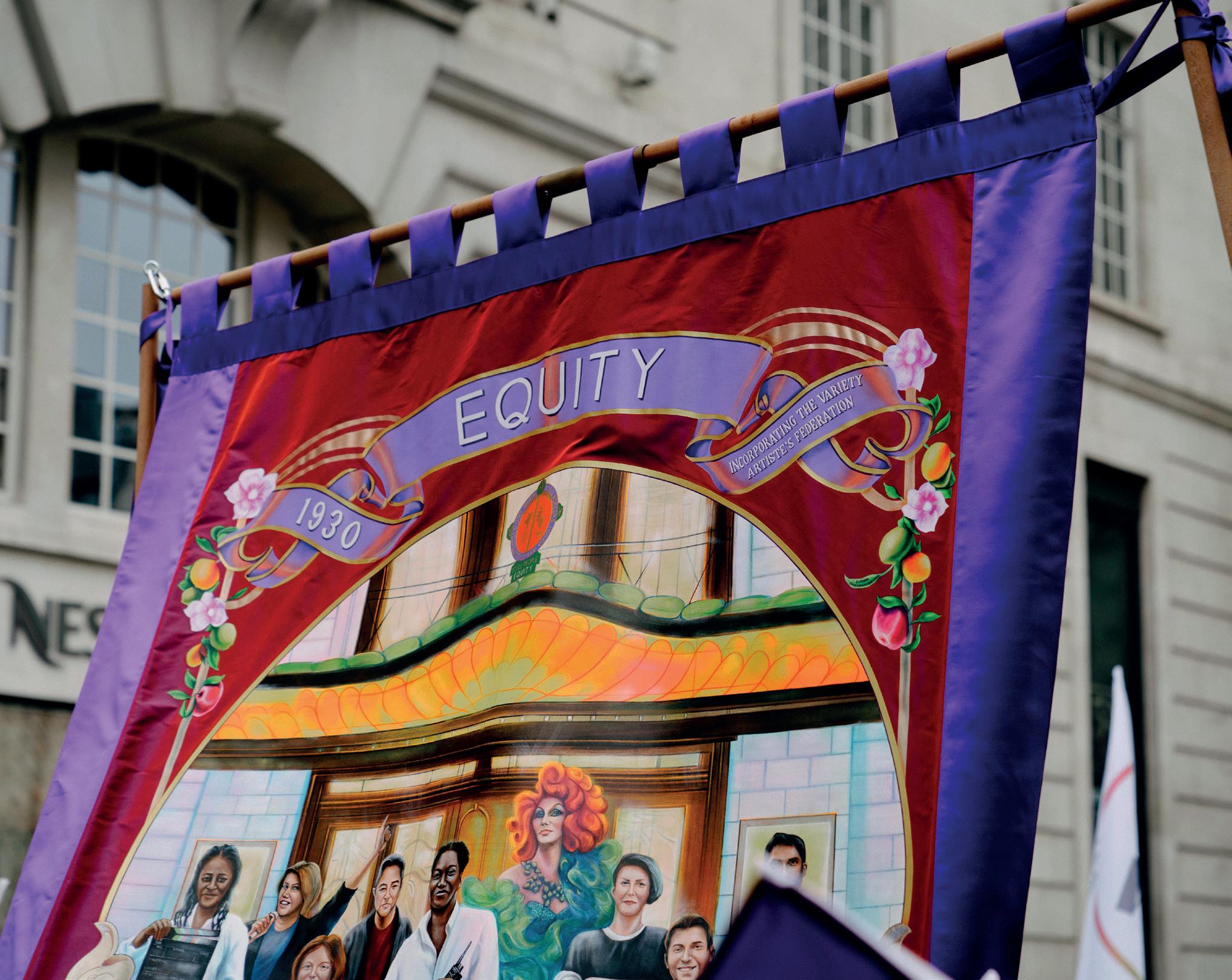
49
VOTE IN THE COMMITTEE ELECTIONS 2023












Voting is now open and closes at 12 noon on Friday 7 July 2023

Equity Committees drive union policy, conduct negotiations and make sure the needs of all Equity members are heard. They submit motions to Equity’s Council and to our annual conference, which can then become policy.
This is your chance to have your say on who should be running this key part of the union’s work. Please have a look at the information provided by the candidates and support your union by voting!


Online voting links have been distributed by email. If you do not have an email address registered with the union, then your voting papers should be included with this magazine. Please contact elections@equity.org.uk if you have any questions.

50
To all artists:
work To all workers: good art To all people: Equity

51
good
Join a union because of who we are, together; not just because of what you do.

Because together, our voice is loud when we make demands of bosses, - whether in theatre, film TV, audio, new media, dance or variety.
Because together we will build an industry where your class, your gender, your sexuality, your race, your disability does not limit what you can do.
Because together your lived experience becomes part of our voice too.
Because together we can fund insurances, legal support and welfare advice - to enable artists to work.

Because together we educate each other and the industry.
Because together we put the future of our industry’s workforce - freelance and employed - at the heart of its future.
Because together politicians of every party have to hear us - and give our industry, its workforce, and all working people the protection we deserve.
Because together we defend freedom of expression for artists in the United Kingdom, and around the globe.



Because together we create the global society working people & artists need to flourish - defend the environment, fight for new housing, better transport, freedom to move.
Because together you are not alone. We are over 46,000 members, and part of a global movement of millions, across the UK and the globe.
Together, and only together, can we say:


To all artists: good work
To all workers: good art


To all people: Equity

52



























































 VIEWS Musical theatre performer and proud Equity Dep Adam Pearce tells us how the theatre community rallied around him after he experienced a lifechanging setback off-stage.
VIEWS Musical theatre performer and proud Equity Dep Adam Pearce tells us how the theatre community rallied around him after he experienced a lifechanging setback off-stage.

 Friends: (from l to r) Dougie Carter, Molly Lynch, Adam Pearce and Danny Mac
Friends: (from l to r) Dougie Carter, Molly Lynch, Adam Pearce and Danny Mac










 Equity’s Alice Adams Lemon with The Playhouse's Kieran Griffiths (Director & Producer) and Mike Moriarty (Chairman)
Equity’s Alice Adams Lemon with The Playhouse's Kieran Griffiths (Director & Producer) and Mike Moriarty (Chairman)





 Uchod; Panel ar aelodaeth undeb yn y sector creadigol, yn cynnwys aelod Equity Saran Morgan / Above; An Eisteddfod panel on union membership in the creative sector, featuring Equity member Saran Morgan
Uchod; Panel ar aelodaeth undeb yn y sector creadigol, yn cynnwys aelod Equity Saran Morgan / Above; An Eisteddfod panel on union membership in the creative sector, featuring Equity member Saran Morgan












 How co-ordinated action stopped the privatisation of Channel 4
How co-ordinated action stopped the privatisation of Channel 4









































 Des Yankson (Credit: Nathan Dainty)
Des Yankson (Credit: Nathan Dainty)

















 Hundreds of Oldham locals turned up to save the Coliseum
Hundreds of Oldham locals turned up to save the Coliseum

 ACE's empty chair at the Oldham Coliseum rally
ACE's empty chair at the Oldham Coliseum rally



























































